DashClicks Blog
The industry's top experts offer their best advice, research, how-tos, and insights—all in the name of helping you level-up your business and online marketing skills.
Join Us!
.jpg)
The Right Way to Partner With a White Label SEO Agency (and Avoid Costly Pitfalls)
Digital marketing firms, web design firms, and companies that want to offer more services but don't want to build their SEO team are turning to white label SEO partnerships more and more. Agencies can offer high-quality, effective SEO solutions under their name by outsourcing SEO services to a specialized provider. This helps them keep clients and improves their market position.
This strategic method saves time and money and gives businesses access to specific expertise, which lets them focus on what they do best and grow in a way that lasts, Agencies expanding their service offerings can also benefit from tools like a Video Analyzer, and a Short Video Script Generator which helps break down client video content for performance insights, SEO optimization, and repurposing across digital platforms.
However, not every white label SEO partner is the same. Picking the right one is important for getting real results and keeping clients happy. In this guide, we'll talk about the most important things you should consider when choosing a white label SEO partner that will help your clients succeed online in 2025 and thereafter.
What Makes White Label SEO Necessary?
Here are some perks before you start looking for a partner.
- If you need experienced SEO teams, you can use Expertise on Demand instead of hiring and training your own experts, especially for small business SEO.
- There is no need to pay for full-time staff, so you only pay for the services you need.
- Easily adjust to fluctuating customer needs, scaling up when needed and scaling down when necessary.
- When you white label, all the reports, dashboards, and products have your logo.
These benefits make a strong case, but the problem is choosing who will do the job.
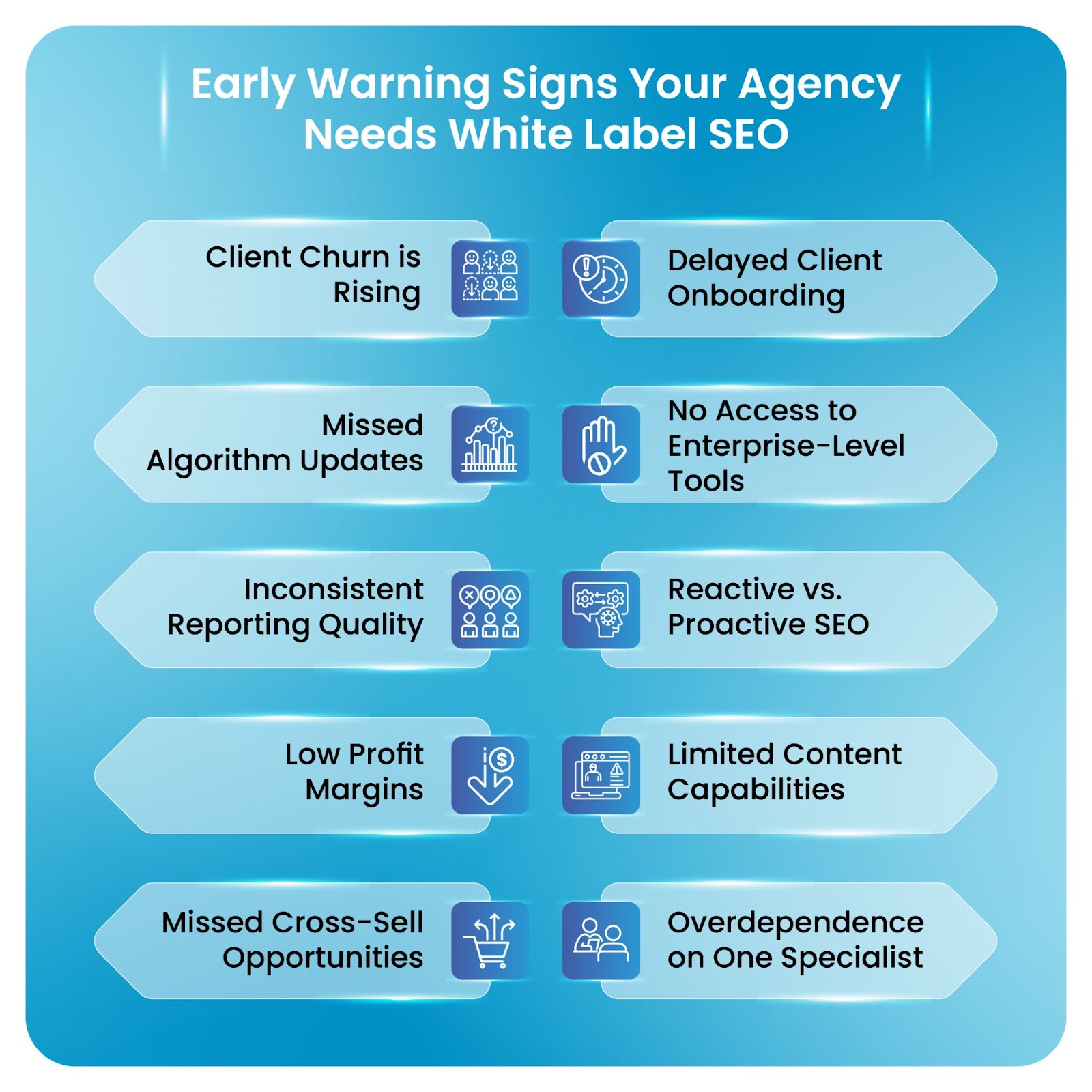
Key Steps to Choosing Your White Label SEO Partner
1. SEO Success Requires Expertise and Experience.
The main reason to look for a white label SEO partner is to benefit from their specific experience. So, it's very important to carefully check out a possible partner's SEO skills. You should look for a service with case studies and client testimonials showing increased traffic, rankings, and conversion rates.
Consider if the provider has industry experience relevant to your clients to help them tailor strategies and comprehend market intricacies. The partner should be skilled in technical SEO audits, keyword research, content creation, and link-building best practices. They should also have experience with your preferred CMS platform—if you use Webflow, for example, look for a white label SEO partner with relevant experience to ensure platform-specific best practices are followed.
2. Transparency and Reporting
Success in white label partnerships requires transparency. A trustworthy service should give you detailed, editable reports with your company's logo that show how your campaign is going and what the most important data is. To avoid getting in trouble with search engines, they should only use honest, "white-hat" SEO methods and be open about how they do things.
The partner must be proactive in updating you and available to answer your inquiries. In addition to providing dashboards or reports that integrate with Google Analytics or Google Search Console, they can be transparent about their SEO tools and data.
3. Modifications and Flexibility
Each client has different SEO needs and goals. There should be a strong white label SEO partner that offers service packages that can be changed to fit the needs of each client, no matter how big or small the business is. Scalability is also very important. For example, when scaling client acquisition, using a data enrichment tool can help you surface relevant company details—like size, industry, and decision-makers—so your team can prioritize and personalize outreach at scale.
This means the partner should be able to handle more work as your business grows and gets more clients or bigger projects. A strong partner will also support agencies looking to improve marketing strategy for diverse industries. The provider should also show that they can change their strategies to fit new algorithms, market conditions, and customer behavior patterns.
4. Conversation and Support
A white label partnership that works well depends on clear and regular contact. Choose a company with a helpful customer service team and easy ways to get in touch with them so that your questions are answered immediately.
A dedicated account manager can be very helpful because they can make communication easier and build a strong sense of partnership and responsibility. Setting up rules for how to communicate from the start is very important. These rules should include preferred methods, how often updates will happen, and how to handle urgent issues or feedback.
5. Pricing and Deal Terms
For a white label SEO partnership to be profitable, both parties must understand how the prices work and the contract terms. Ask for a clear price that includes all costs, including any possible extra fees or charges for more services. Check the pricing plan to make sure it gives you the opportunity to make a profit when you sell the services to others, and that it also meets the needs of your market.
Avoid rigid, long-term contracts that might make it hard for your business to adapt. Instead, look for flexible contract terms that let you make changes based on changing client needs or market shifts.
6. Respecting Privacy and Keeping Data Safe
Discuss how they handle data protection and privacy, especially in light of laws like GDPR and CCPA. To keep sensitive client information safe, make sure the service provider uses strong security measures such as encryption, tight access controls, and regular audits. To make sure that everyone is on the same document when it comes to security, you need a full legal deal that includes NDAs and Data Processing Agreements.
7. White-Labeling Options and Training
Make sure the source really does offer white label solutions, such as reports and materials for clients that can be customized and marked up with your agency's name and contact information. Some providers also offer training and educational materials to help your team understand SEO concepts better and communicate with clients more effectively, which makes the relationship stronger as a whole. For example, foundational SEO insights—like those outlined in this guide from ZenBusiness—can be reinforced with white label resources to ensure consistent messaging and education across your team and clients.
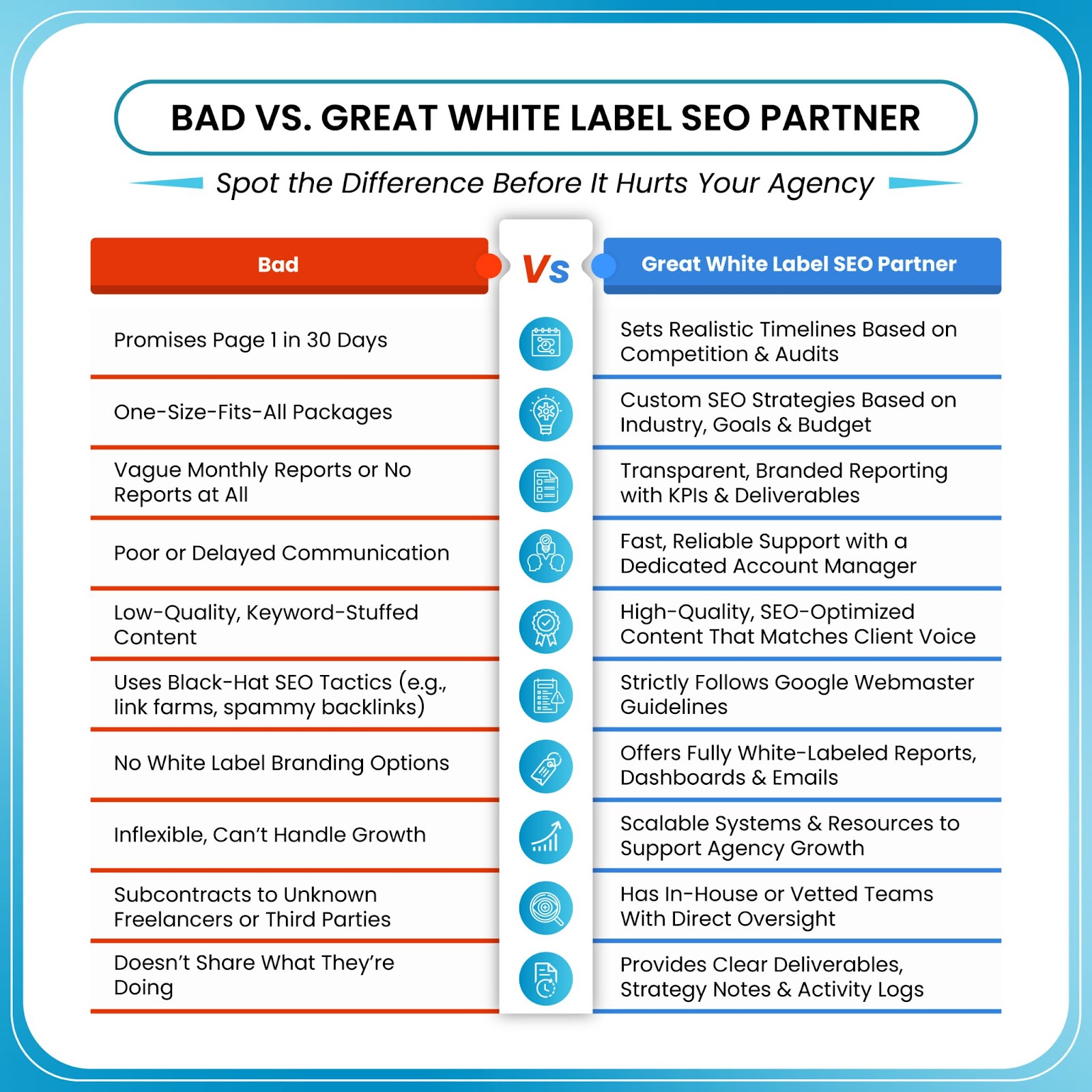
Metrics to Evaluate Success
A white label SEO partnership isn’t “set and forget.” To know if your partnership is truly moving the needle, track specific KPIs that tie directly to your agency’s goals. These metrics help you measure both client satisfaction and business impact:
- Client Retention Rate: If clients stay longer after you’ve partnered with a white label provider, that’s a strong indicator of improved service quality.
- Organic Traffic and Keyword Rankings: Monitor how quickly your clients climb the SERPs for their target keywords and whether traffic aligns with conversion goals.
- Campaign ROI: Track the cost of outsourcing versus the revenue generated from retained and new clients. A successful partnership should boost your margins over time.
- Time Savings: Measure hours saved on campaign execution and reporting—time you can reinvest into strategy, sales, or client relationships.
Regularly reviewing these numbers ensures that the partnership continues to deliver tangible value, not just completed tasks.
Questions to Ask Before Signing a Contract
Choosing a white label SEO agency is a long‑term investment. Asking the right questions upfront helps avoid unpleasant surprises later:
- What SEO tools and platforms do you use? - Ensure they align with your reporting needs and can integrate seamlessly with your existing tech stack.
- Do you have proven results in our clients’ industries? - Request case studies or examples relevant to niches you serve (e.g., e‑commerce, real estate, healthcare).
- How do you handle algorithm updates or major SEO shifts? - A reliable partner should have contingency plans and communicate changes proactively.
- What level of customization do you offer? - Confirm they can tailor strategies, reporting, and even branding to fit your agency’s standards.
- What are your communication and reporting protocols? - Clarify frequency of updates, dedicated account manager availability, and response times for urgent queries.
These questions set expectations and build transparency from day one.
Post‑Partnership Optimization
Signing the contract is only the start of building a strong white label SEO partnership. To get the most out of the relationship:
- Schedule Regular Reviews: Quarterly performance check‑ins help identify wins, address gaps, and realign strategies with client goals.
- Establish Feedback Loops: Gather feedback from your clients and share it with the provider. This ensures strategies remain relevant and continuously improve.
- Refine Goals as You Scale: Your needs will evolve—what worked for 5 clients may not work for 50. Keep your partner informed about growth plans so they can scale accordingly.
- Encourage Knowledge Sharing: Ask your partner to share insights on trends, tools, or tactics so your internal team grows alongside them.
This ongoing optimization turns your partnership from a transactional arrangement into a collaborative growth engine.
DashClicks offers a complete suite of white label SEO services designed for agencies that want to scale without the stress of building an in‑house team. From keyword research and on‑page optimization to link building, content creation, and technical audits, every campaign is executed by SEO specialists using proven strategies and industry‑leading tools.
With fully white‑labeled dashboards and reports, you can present results to clients under your own brand—complete with real‑time performance data. DashClicks’ platform also integrates seamlessly with tools like Google Analytics and Google Search Console, ensuring accurate, transparent insights.
Whether you serve small businesses, e‑commerce brands, or enterprise clients, DashClicks makes it easy to deliver high‑quality SEO outcomes at scale while keeping your agency’s overhead low and your clients satisfied.
Wrapping It Up
Selecting the right white label SEO partner is a strategic decision that can profoundly impact your agency's growth and client satisfaction.
Partnering with the best white label SEO agency ensures not only white-label flexibility but also access to proven strategies, client-ready reporting, and scalable campaign execution for lasting success. You can build a strong partnership that gets real, measurable results for your clients in digital marketing by carefully analyzing possible partners based on their expertise, openness, communication, flexibility, and commitment to doing things correctly.
Remember that the best partner won't just do SEO work for you; they'll also become an extension of your team and help you give more services, improve your reputation, and grow your business in a way that lasts.
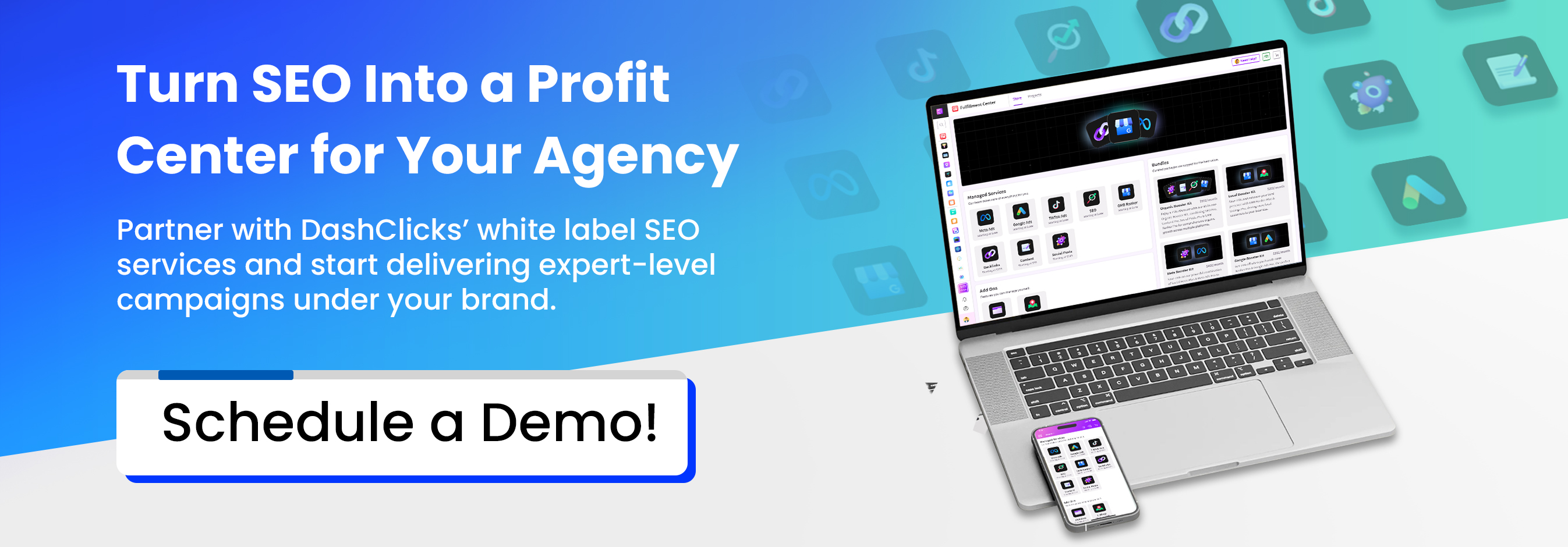

White Label SEO Programs: 13 Factors to Consider When Vetting
Struggling to scale your digital marketing agency while keeping up with diverse client needs? You’re not alone. According to HubSpot, 63% of marketers say generating traffic and leads is their biggest challenge. Meanwhile, industry benchmarks show that around one-third to half of marketing agencies struggle with client acquisition and scaling growth effectively.
For many agencies and small businesses, white label SEO programs offer a powerful solution—providing expert SEO services without the overhead of an in-house team. The global SEO services market is projected to reach $171.77 billion by 2030, with white label partnerships driving a significant portion of that growth.
This comprehensive guide is built for agencies and small businesses looking to scale sustainably through the right SEO reseller partner. Whether you're aiming to improve scalability, reduce operational costs, or deliver high-quality results, choosing the right provider is key to your long-term success.
We’ll explore 13 essential factors you should consider when vetting a white label SEO partner—covering how each one impacts your agency’s scalability, reputation, and client satisfaction.
1. Track Record and Reputation
Your agency’s reputation is only as strong as the partner delivering your services. When evaluating a white label SEO provider, their track record essentially becomes your own. A partner with a proven history of delivering results reduces the risk of client dissatisfaction and builds long-term trust.
Start by reviewing their portfolio and client testimonials. Focus on outcomes backed by data rather than vague claims like “increased traffic.” According to BrightLocal, 87% of consumers read online reviews for local businesses, so third-party validation is crucial.
Use platforms like Clutch, Trustpilot, and Google Reviews to verify credibility. Pay attention to how they respond to negative feedback—it reveals their attitude toward service quality and accountability.
A trustworthy white label SEO company should offer:
- At least 3–5 years of experience in the industry
- Documented case studies with measurable results
- Client retention rates above 85%
- Positive reviews across multiple platforms
- Industry certifications and partnerships with major tools and platforms
2. SEO Expertise and Available Services
The depth and range of your partner’s SEO services will directly impact your ability to serve a wide variety of clients. A comprehensive SEO reseller program should cover the full spectrum of modern optimization practices.
Essential services should include keyword research and strategy, on-page optimization, technical SEO audits, content creation and optimization, link-building campaigns, local SEO for businesses with physical locations, and e-commerce SEO for online retailers. Advanced services might cover voice search optimization, mobile-first indexing strategies, and Core Web Vitals optimization.
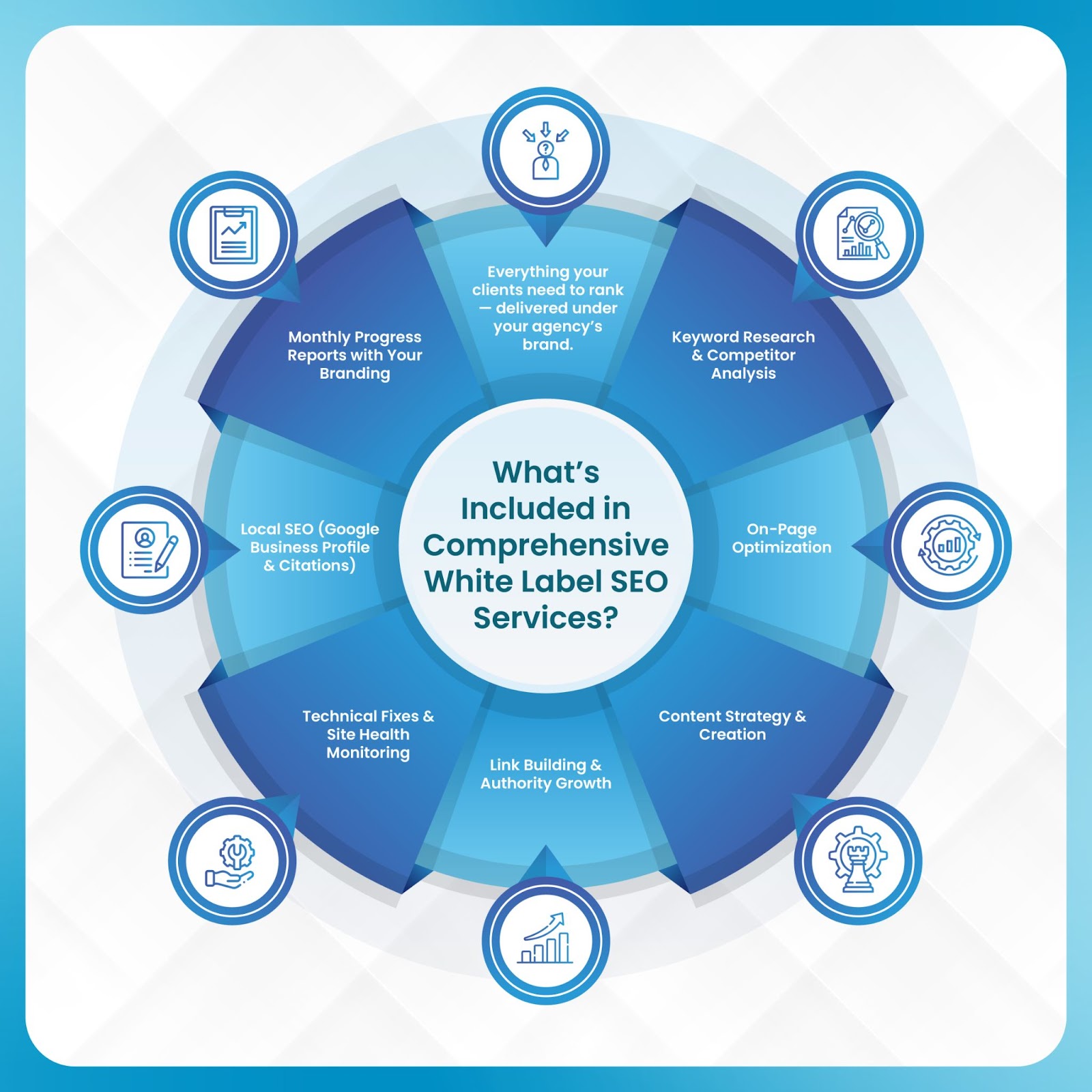
According to Backlinko, businesses that blog receive 97% more links to their website, highlighting the importance of content-focused SEO strategies. Your white label SEO partner should demonstrate expertise across these areas and show evidence of staying current with algorithm updates and industry best practices.
Look for providers who offer specialized expertise in your target industries. A partner experienced in healthcare SEO will understand HIPAA compliance requirements, while one familiar with e-commerce can navigate product schema markup and conversion optimization.
3. Scalability
Your white label SEO partner must accommodate fluctuations in demand as your agency grows. Research by the Small Business Administration shows that only 50% of businesses survive past five years, often due to scalability challenges.
Effective scalability means your partner can handle sudden increases in client volume without compromising service quality. They should offer flexible packages and service tiers that allow you to start small and expand as needed. This includes the ability to add or remove services, adjust campaign budgets, and modify reporting frequency based on client requirements.
Key scalability indicators include:
- Flexible contract terms that don't lock you into rigid structures
- Tiered pricing models that reduce per-client costs as volume increases
- Dedicated account management that scales with your business
- Technology infrastructure capable of handling growth
- Clear processes for onboarding new clients quickly
Ask about their current capacity. A partner already operating near full capacity may struggle to accommodate your expansion plans.
4. Pricing Transparency
Hidden fees can damage client trust and cut into your profits. According to PwC, 73% of consumers view pricing as a major factor in decision-making. Transparent, predictable pricing is essential.
Understand all upfront costs, including setup fees, monthly service charges, and any additional costs for extra services or revisions. Compare different pricing models to find the best fit for your business structure.
Common pricing models include:
- Flat Rate: Fixed monthly cost regardless of hours worked
- Pay-as-you-go: Charges based on actual services delivered
- Project-based: Set price for specific deliverables
- Tiered Packages: Different service levels at various price points
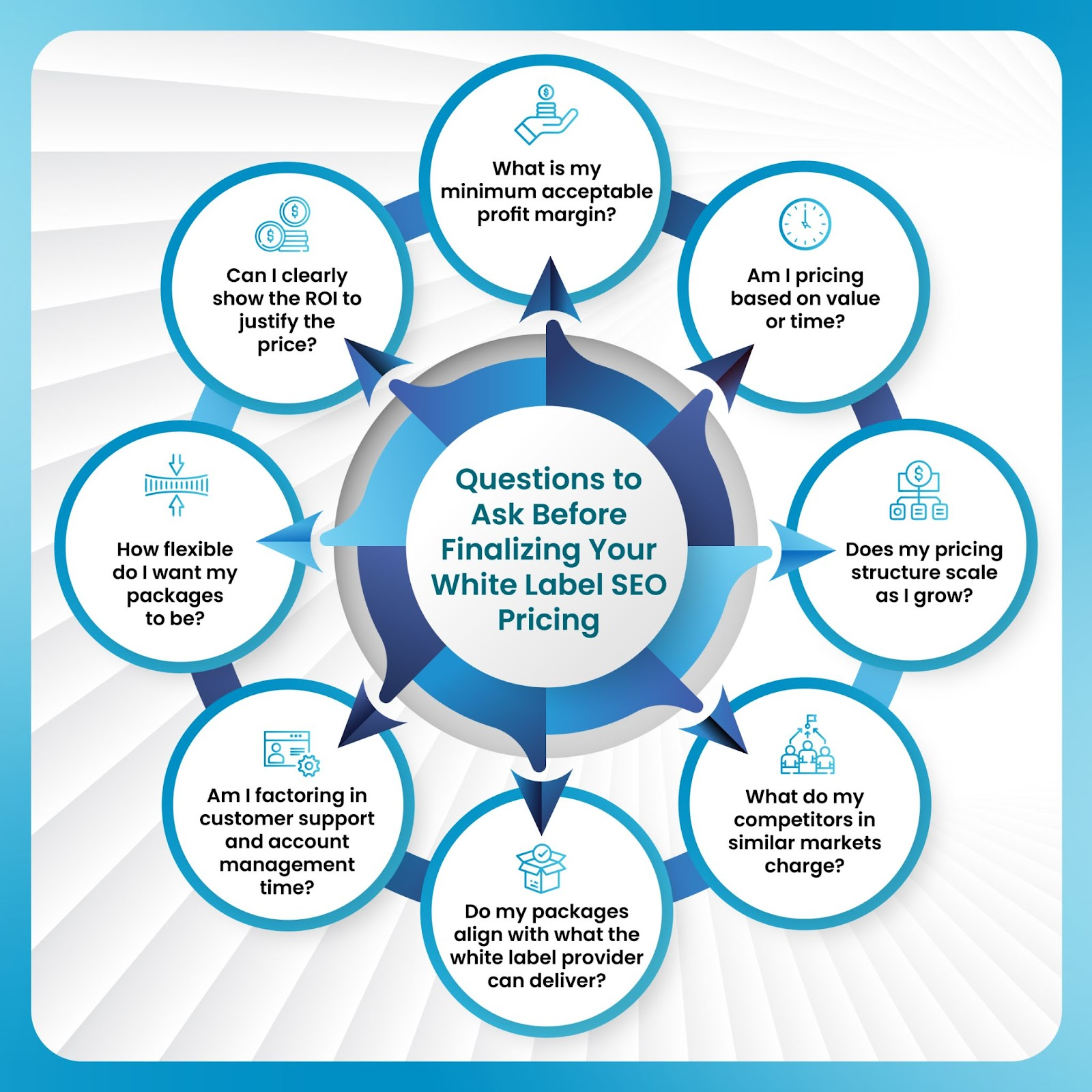
Request detailed service-level agreements (SLAs) that outline what's included in each package, response times for different types of requests, and penalties for missed deadlines. This documentation protects both parties and sets clear expectations.
Be wary of providers offering significantly below-market pricing, as this often indicates shortcuts in service quality or hidden costs that emerge later.
5. Communication and Support
Poor communication can jeopardize client relationships and delay critical projects. According to the Project Management Institute, ineffective communication is the primary cause in roughly one-third of project failures.
Your white label SEO partner should provide dedicated account management with consistent points of contact. Look for providers offering multiple communication channels, including phone, email, chat, and project management platforms.
Essential communication features include:
- Designated account managers familiar with your business
- Regular progress updates and status calls
- 24/7 support for urgent issues
- Clear escalation procedures for problem resolution
- Proactive communication about industry changes or opportunities
Evaluate their response times during the vetting process. If they're slow to respond to sales inquiries, they'll likely be slow to respond to service requests. The best partners provide same-day responses to non-urgent matters and immediate attention to critical issues.
6. Customization and Branding Options
Seamless brand integration is crucial for maintaining client trust and agency credibility. Your white label SEO partner should offer comprehensive branding options that make their services appear as natural extensions of your agency.
Look for providers offering fully branded dashboards that display your logo, colors, and messaging. Client-facing reports should be customizable with your branding elements and formatted according to your standards. The client interface should integrate smoothly with your existing tools and maintain consistent brand identity throughout all touchpoints.
Advanced branding options include:
- Custom domain names for client portals
- Branded email communications
- Your agency's contact information on all deliverables
- Customizable report templates and layouts
- Integration with your existing CRM and project management systems
7. Compliance and Ethical SEO Practices
Working with agencies that follow ethical SEO practices protects both your reputation and your clients' websites from search engine penalties. Google processes over 8.5 billion searches per day, and its algorithms are increasingly sophisticated at detecting manipulative tactics.
White-hat SEO practices focus on creating valuable content, earning legitimate backlinks, and improving user experience. These sustainable approaches build long-term search visibility rather than quick fixes that can result in penalties.
Dangerous black-hat tactics to avoid include:
- Link farming and private blog networks
- Keyword stuffing and content spinning
- Cloaking and doorway pages
- Negative SEO attacks on competitors
- Schema markup manipulation
Verify that your potential partner follows Google's Webmaster Guidelines and stays current with algorithm updates. They should be able to explain their methodologies and provide transparency about their link-building sources and content creation processes.
8. Reporting and Analytics Capabilities
Transparent reporting builds client trust and demonstrates the value of your SEO investments. Modern businesses expect real-time access to their marketing data, with 89% of marketers reporting that data-driven insights improve their campaign performance.
Your white label SEO partner should provide comprehensive reporting that includes keyword rankings and movement, organic traffic growth and sources, conversion tracking and goal completions, backlink acquisition and quality metrics, technical SEO issue identification and resolution, and competitor analysis and market positioning.
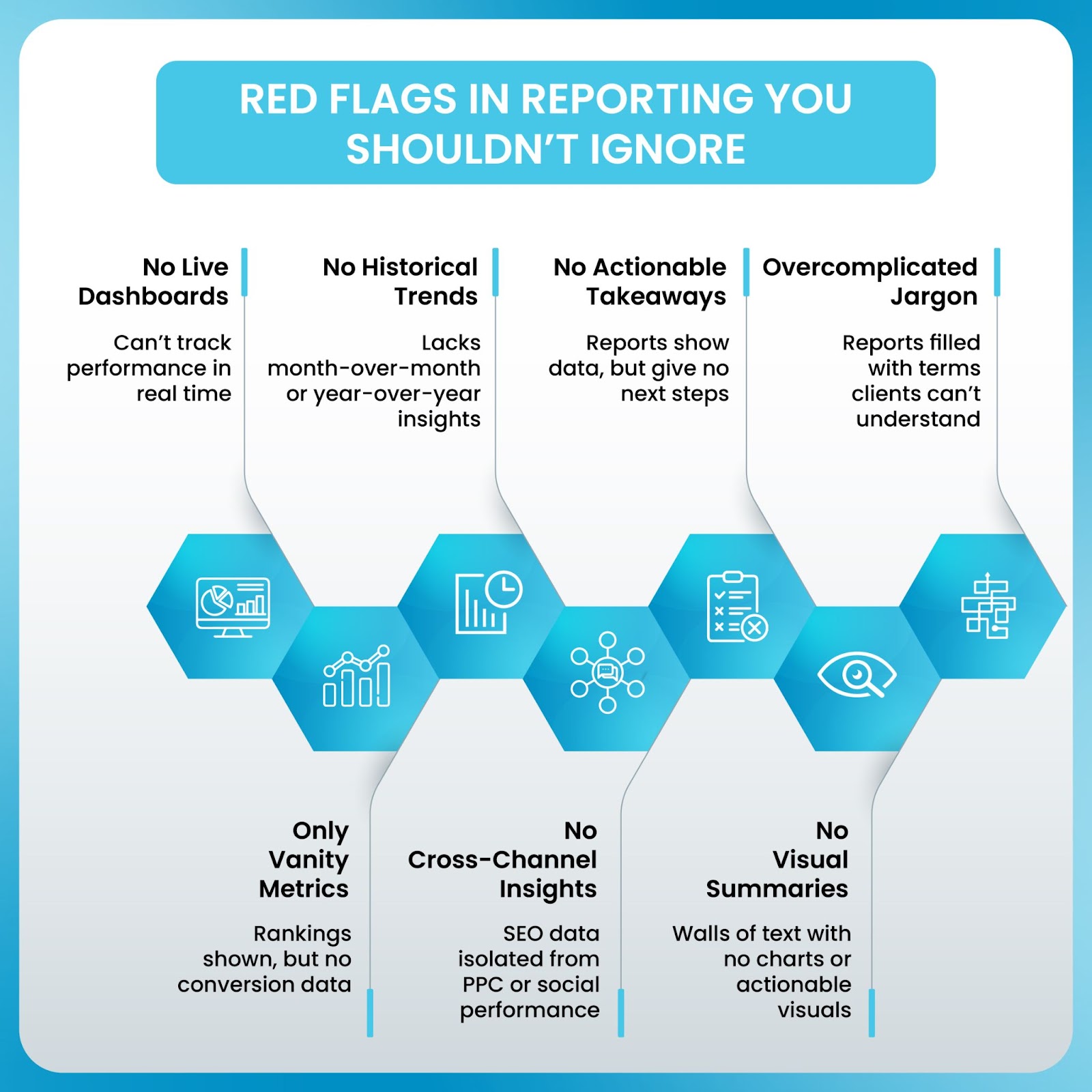
The best reporting platforms offer both automated periodic reports and real-time dashboards that clients can access independently. This transparency reduces the time you spend answering client questions about campaign progress and builds confidence in your services.
Ensure reports are easily understandable for non-technical clients while providing enough detail for informed decision-making. Look for providers who can customize reporting frequency and format based on client preferences.
9. Data Security and Confidentiality
Safeguarding client data is critical when outsourcing SEO work, especially given that 43% of cyber attacks target small businesses. Your white label SEO partner will likely need access to sensitive information, including website analytics, search console data, social media accounts, and sometimes even customer databases.
Essential security measures include:
- Comprehensive non-disclosure agreements (NDAs)
- Data encryption in transit and at rest
- Regular security audits and certifications
- Limited access protocols with role-based permissions
- Secure file sharing and communication platforms
- Clear data retention and deletion policies
Ask about their cybersecurity certifications, employee background checks, and incident response procedures. A security breach involving client data could devastate your agency's reputation and result in legal liability.
10. Client Access and Dashboard Simplicity
User-friendly client dashboards improve satisfaction and reduce support requests. The ideal client portal should provide intuitive navigation that doesn't require training, real-time access to key performance metrics, mobile-responsive design for on-the-go access, role-based permissions for different user types, and integration with popular business tools.
Test the dashboard yourself during the evaluation process. If you find it confusing or difficult to navigate, your clients will too. The best platforms offer demo accounts that let you experience the full functionality before committing.
Consider how the dashboard handles different client sophistication levels. Some clients want high-level summaries, while others prefer detailed technical data. Your white label SEO comapny should accommodate both preferences.
11. Case Studies of Real Success
Concrete examples of past successes provide insight into what your white label SEO partner can achieve for your clients. According to the Content Marketing Institute, case studies are one of the most effective form of content marketing for B2B companies.
Quality case studies should include specific industry contexts that match your target clients, measurable results with before-and-after metrics, timeframes for achieving results, challenges overcome during the campaign, and strategies and tactics employed.
Look for case studies spanning different industries and business sizes. A provider with success stories only from large enterprises may not understand the unique challenges facing small businesses.
Pay attention to the metrics emphasized in case studies. Providers focusing solely on traffic increases without mentioning conversions or revenue impact may not understand business outcomes.
12. Adaptability to Market Trends
SEO evolves rapidly, with Google making hundreds of algorithm updates annually. Your white label SEO partner must stay current with industry changes and adapt strategies accordingly.
Current trends shaping SEO include E-E-A-T (Experience, Expertise, Authoritativeness, Trustworthiness), visual and voice search optimization, AI-powered content and tools, Core Web Vitals and page experience signals, and mobile-first indexing requirements.
According to Google, 50% of consumers who conducted a local search on their smartphone visited a store within a day, highlighting the importance of staying current with mobile and local search trends.
Evaluate how quickly your potential partner adopted recent changes like the helpful content update or product review guidelines. Providers who are slow to adapt may leave your clients behind competitors who embrace new opportunities.
13. Partnership Flexibility
Low-risk partnership options allow you to test fit before making long-term commitments. According to Harvard Business Review, 60-70% of business partnerships fail, often due to misaligned expectations or rigid contract terms.
Look for providers offering trial periods or pilot programs, month-to-month contract options alongside longer-term agreements, the ability to modify services as needs change, clear exit clauses without excessive penalties, and scalable pricing that adjusts with your business growth.
Flexibility also extends to service delivery. Your needs may change as you gain experience with white label SEO or as your client base evolves. The best partners accommodate these changes without forcing you into entirely new agreements.
Consider providers who offer multiple engagement models, from full-service management to a la carte offerings that let you pick specific services as needed.
Further Reading: White Label Services: Maximizing Agency GROWTH Through Partnership
DashClicks – A Leading White Label SEO Provider
If you're looking for a white label SEO partner with both breadth and depth in services, DashClicks is a standout provider trusted by thousands of marketing agencies worldwide.
They offer white label SEO services designed for scale, results, and agency branding. Their SEO services are divided into structured phases—ensuring transparency, strategic planning, and measurable performance at every step.
An Overview of What Makes DashClicks’ SEO Program Exceptional:
A. In-Depth Keyword Research & Strategy Development
DashClicks begins every campaign with thorough keyword research based on the client’s niche, goals, and competition. They use advanced tools and real-time data to identify high-value keywords that align with both traffic opportunities and buyer intent. Their keyword strategy includes:
- Focus keyword mapping to each page
- Long-tail keyword inclusion for organic growth
- Geo-targeted keywords for local SEO clients
- Competitor keyword gap analysis
B. On-Page & Technical SEO
Their team optimizes each page based on modern SEO best practices. This includes:
- Title tag and meta description optimization
- Header tags (H1-H6) structuring
- Internal linking for site architecture
- Mobile responsiveness
- Schema markup implementation
- Image optimization and alt-text
- Fixing crawl issues, broken links, and duplicate content
They also conduct in-depth technical SEO audits and implement improvements like boosting site speed, ensuring secure protocols (HTTPS), and correcting indexing problems—vital for long-term search performance.
C. High-Quality Content Creation
Content plays a pivotal role in SEO, and DashClicks delivers on this with SEO-friendly content designed for both users and search engines. Their writers create:
- Optimized website pages
- Blog posts and supporting content
- Geo-targeted location pages
- Service pages based on keyword clusters
- Niche content aligned with each client’s tone and branding
Their writing team ensures every piece is crafted for relevance, quality, and engagement—critical for building E-E-A-T (Experience, Expertise, Authoritativeness, and Trustworthiness).
D. Link-Building & Off-Page SEO
Backlinks are one of the most important ranking factors, and DashClicks executes a clean, ethical link-building strategy that focuses on:
- Acquiring backlinks from high-authority domains
- Avoiding link schemes or low-quality sources
- Diversified anchor text strategies
- Brand mentions and citations for local SEO
They also handle directory submissions and reputation management for small businesses that rely on visibility in local search results.
E. Transparent Reporting & Real-Time Dashboards
DashClicks provides agencies and clients with real-time reporting dashboards that are fully white-labeled. You can track:
- Keyword rankings and SERP movement
- Organic traffic growth
- Click-through rates (CTR) and conversions
- Backlink metrics
- Completed deliverables and campaign progress
The dashboard is intuitive, mobile-friendly, and customizable—allowing agencies to present live SEO data under their own brand. Whether you’re an agency new to outsourcing or you're looking to expand your current offerings, DashClicks offers a robust, transparent, and results-driven white label SEO services that scales with your growth.
Key Takeaways for Your Agency's Success
Choosing the right white label SEO partner isn't just a vendor decision—it's a strategic move that will define your agency's growth trajectory and service capabilities. The 13 factors we've covered provide a comprehensive framework for evaluation, but remember that the best partner for your agency depends on your specific needs, client base, and growth objectives.
By thoroughly evaluating track record and reputation, service expertise, scalability options, pricing transparency, communication standards, branding capabilities, reporting features, ethical practices, security measures, user experience, proven results, market adaptability, and partnership flexibility, you'll position your agency for sustainable growth and client satisfaction.
The most successful agency partnerships are built on shared values, complementary strengths, and mutual commitment to client success. Take time to find a partner who aligns with your agency's mission and can grow alongside your business.
Start by shortlisting potential white label SEO companies that meet your criteria using this guide. Request demos or introductory calls to better understand their deliverables and support infrastructure. The right partnership can unlock new possibilities for your business and provide the foundation for long-term success in the competitive digital marketing landscape.
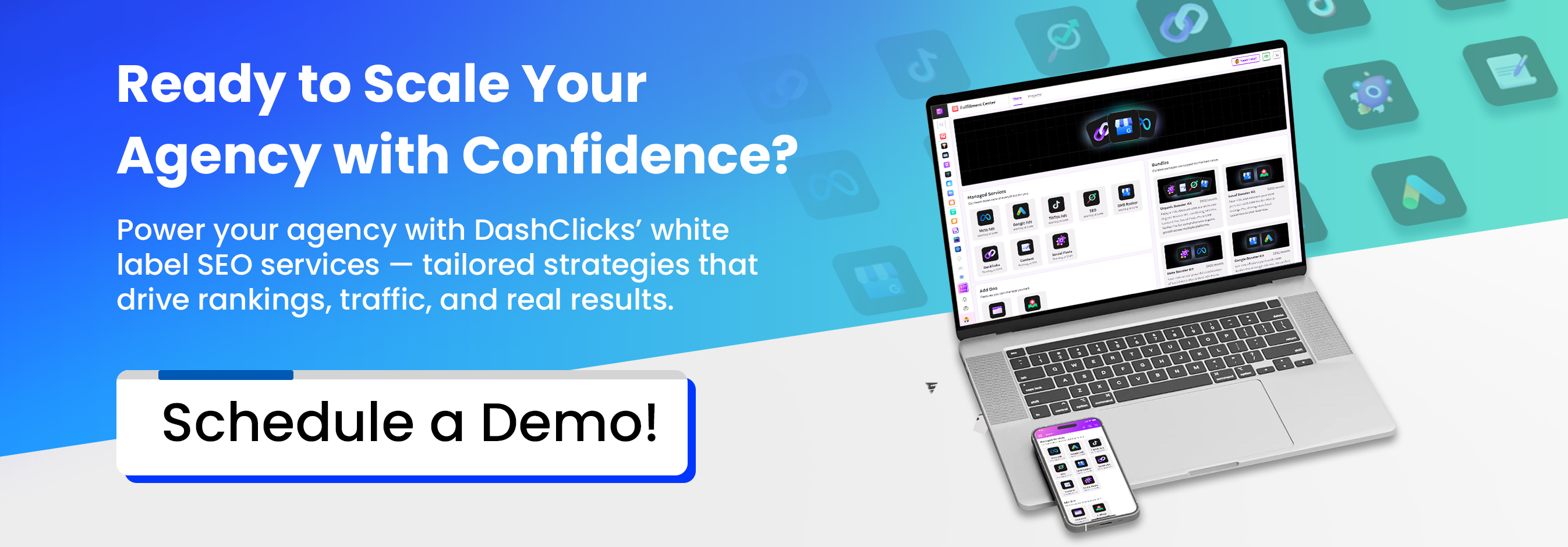

Becoming a White Label SEO Reseller: A Comprehensive Guide to Scaling Your Agency
The digital marketing world is growing faster than ever, and SEO is leading the charge. With over 93% of all online experiences beginning with a search engine, it’s no surprise that businesses across all sectors are ramping up their SEO efforts to drive organic visibility, build trust, and secure long-term growth.
The global SEO services market is projected to rise from $68.1 billion in 2023 to over $103.24 billion by 2028, according to recent industry research. This surge highlights a massive opportunity for digital agencies to offer SEO—not necessarily by building an in-house team, but by reselling white label SEO services under their brand.
If your agency lacks the bandwidth, specialized staff, or technical expertise to provide end-to-end SEO internally, becoming a white label SEO reseller could be the fastest and most cost-efficient path to scale.
Why Agencies Are Abandoning the “Do It All” Mindset?
Trying to master every digital service internally isn’t just impractical—it’s increasingly unsustainable. Modern agencies are under pressure to deliver faster, provide more value, and maintain quality, all while staying profitable. Hiring a full SEO team, managing training, and keeping up with Google’s 500+ algorithm updates yearly simply isn’t feasible for most small or mid-sized agencies.
A recent HubSpot report revealed that nearly 50% of marketing agencies outsource at least part of their SEO, with white label partnerships being one of the most common models. Why? Because they allow agencies to scale rapidly without operational complexity or hiring costs.
Rising Demand for SEO Services Among Businesses
Businesses are investing more into SEO than ever before—and they’re looking for providers who can deliver measurable results. Consider these key stats:
- 70% of marketers say SEO is more effective than PPC for generating sales over time (Databox).
- 75% of users never scroll past the first page of Google results (HubSpot).
- Companies that blog consistently (a key component of SEO) get 67% more leads than those that don’t.
As these trends continue, marketing agencies must meet this demand—or risk losing clients to competitors who do.
What “White Label” Really Means for Your Brand Identity?
Many agency owners hesitate at the idea of outsourcing, fearing it could dilute their brand. However, white label SEO is designed to do the opposite—strengthen your brand presence while expanding your capabilities.
Here’s how:
- Fulfilment Behind the Curtain: White label SEO providers handle all back-end work (strategy, link building, content, audits) while your brand remains the face of the service.
- Client Trust Preservation: You remain the primary point of contact. Clients only see your branding on reports, dashboards, and communications.
- Psychological Advantage: When clients see a unified brand (yours), it builds confidence. There’s no need to reveal that fulfilment is outsourced—because with white label services, it feels in-house.
What Does It Mean to Be a White Label SEO Reseller?
A white label SEO reseller is an agency that sells SEO services under its brand while outsourcing the actual execution to a third-party provider. The client only interacts with your agency, never knowing that another team is handling the fulfillment work.
This model provides the best of both worlds: you can offer high-quality SEO services without needing in-house specialists, developers, or content writers.
What “White Label” Means for Client Perception and Brand Control?
Client trust is one of your most valuable assets. White label SEO helps protect and enhance that trust by:
- Delivering expert-level SEO without delivery delays or inconsistencies.
- Ensuring all reports, dashboards, and deliverables are fully branded.
- Giving clients a seamless experience, with no sense of third-party involvement.
According to BrightLocal, 84% of customers value transparency and brand consistency when working with marketing service providers. White label SEO lets you deliver both—at scale.
Spotting the “Reseller-Ready” Moment in Your Agency’s Journey
Knowing when to evolve from a full-service provider into a white label SEO reseller can make all the difference in your agency’s growth trajectory. If you're on the fence, look out for these signs—it might be time to stop juggling everything and start scaling smart.
- Clients Keep Requesting SEO… But You Can’t Fulfill It Internally: If you're constantly turning down SEO projects or referring them to other providers, you're leaving money—and long-term client relationships—on the table. Reselling lets you say “yes” to more without overloading your team. Whether it’s keyword strategy, content creation, or local SEO, repeated client demand signals a clear opportunity.
- Your Team Lacks the Technical SEO Expertise: You may offer social media, email marketing, or web design—but SEO is a different beast. It requires ongoing training, advanced tools, and deep knowledge of algorithms, audits, link-building, and more. According to Moz, 64% of marketers consider link-building the most challenging aspect of SEO. If your team isn’t equipped to handle this complexity, outsourcing fulfilment is the smart move.
- You Want to Increase MRR Without Increasing Operational Costs: Recurring revenue is the backbone of any scalable agency model. White label SEO allows you to add high-margin, recurring services without the cost of hiring new staff or building processes from scratch. Agencies with recurring revenue models grow 2.3x faster than those dependent on one-off projects (Forrester). You get the benefit of monthly SEO retainers—without the burden of fulfilment.
- Your Agency’s Growth Has Plateaued Due to Limited Offering: If you're great at design, ads, or branding—but clients start asking for comprehensive digital packages—limited services can hold your agency back. Expanding into SEO unlocks new markets, enhances client retention, and positions you as a one-stop solution. Offering bundled services can increase client lifetime value by up to 50% (HubSpot).
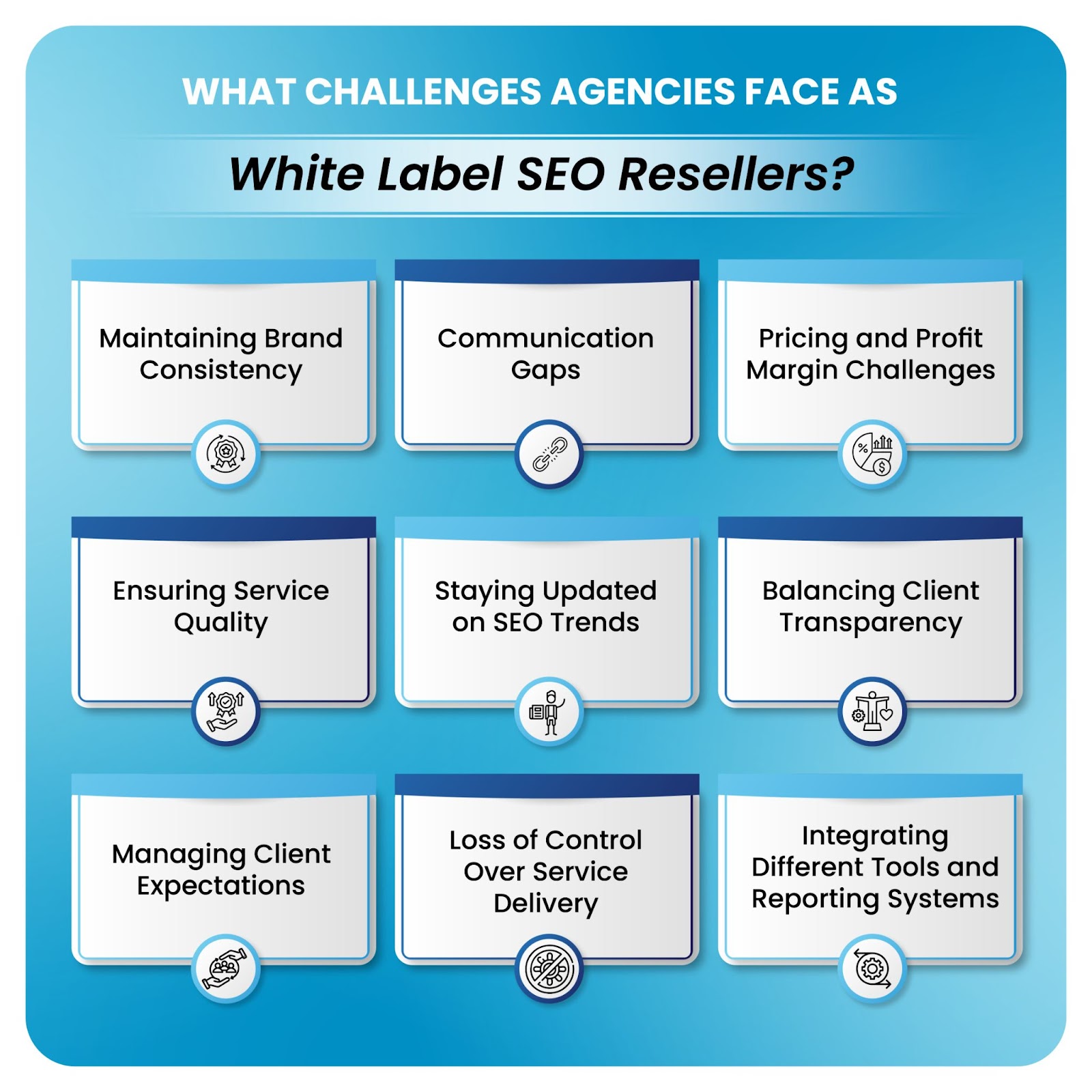
Steps to Becoming a White Label SEO Reseller
Ready to scale your agency without the headaches of in-house fulfilment? Follow this structured roadmap to build a thriving white label SEO offering under your brand.
Step 1: Assess Your Current Service Capabilities
Before jumping in, take a clear-eyed look at your agency’s existing capabilities:
- Do you lack in-house technical SEO skills such as site audits, schema markup, or crawl optimisation?
- Are your clients requesting high-quality blog content or backlinks you can’t consistently deliver?
- Is your team stretched too thin to manage SEO projects while handling your core services?
By identifying your internal gaps—whether it’s knowledge, bandwidth, or tools—you’ll be better equipped to find the right white label SEO partner who fills those exact needs.
Pro Tip: Survey your clients to discover untapped SEO demand you might be missing.
Step 2: Choose the Right SEO Reseller Partner
Your reseller will be an extension of your team—so it’s critical to choose wisely. Look for:
- Proven Track Record: Ask for verifiable results—case studies, testimonials, and third-party reviews. Check for niche expertise (e.g., local SEO, eCommerce, etc.).
- Transparency: Ensure clear pricing models, well-defined deliverables, and transparent reporting mechanisms are in place. Ambiguity is a red flag.
- Flexible Packages: A one-size-fits-all solution won’t cut it. Look for customisation based on business size, industry, and goals.
- Responsive Support: Fast, consistent communication is essential—ideally through a dedicated account manager or partner success team.
Further Reading: How to Choose a White Label SEO Partner That Delivers Real Results
Step 3: Set Realistic Expectations With Clients
SEO is not an overnight fix—it’s a long-term investment. One of the biggest mistakes agencies make is overpromising results.
- Be upfront. Results typically begin to appear between 3 to 6 months.
- Educate clients on KPIs like keyword rankings, traffic growth, and backlink acquisition.
- Provide regular performance reports and explain the “why” behind each metric.
Pro Tip: Use branded reports and dashboards to reinforce credibility and transparency.
Step 4: Integrate White Label SEO Into Your Agency Workflow
A seamless process is key to delivering consistent value.
- Build SEO tasks into your existing onboarding and project timelines.
- Assign internal team members to liaise with the white label SEO provider.
- Use shared tools like DashClicks’ Conversations Software to centralise communication.
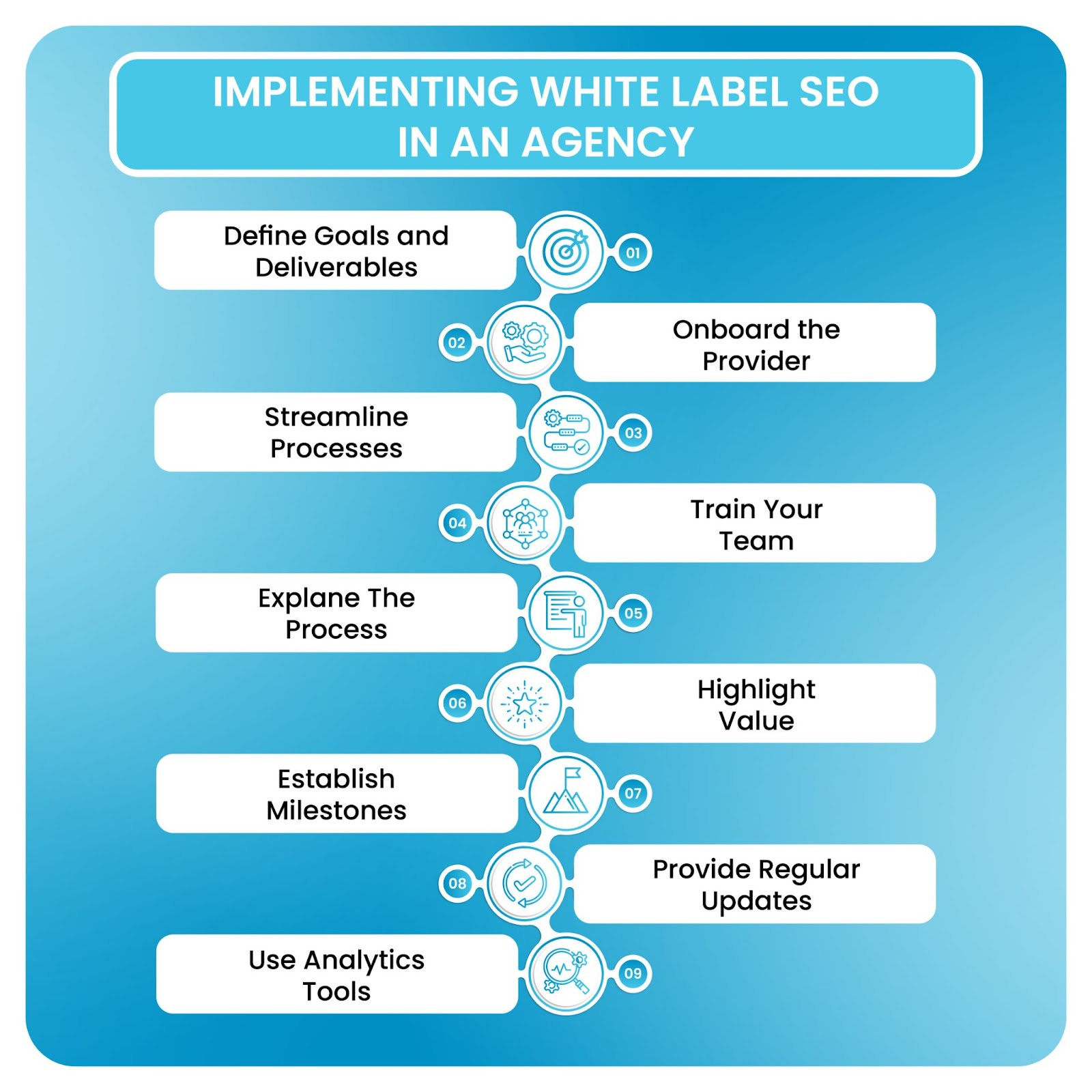
The smoother your internal processes, the better the client experience.
Step 5: Leverage Automation and Technology
Manual processes don’t scale—but automation does. Leading white label providers like DashClicks offer:
- Live Dashboards: Give clients access to real-time SEO metrics and campaign progress.
- Automated Reports: Save hours on monthly performance reporting.
- CRM & Task Integrations: Keep sales, support, and fulfilment in sync.
Automation not only saves time, but it also reduces errors and enhances your professionalism.
Fact: Agencies using automation grow 1.6x faster than those relying on manual methods.
Step 6: Brand Everything as Your Own
Client experience is everything—and branding plays a major role in shaping it.
- Use white label dashboards, reports, emails, and client portals.
- Ensure your logo, colours, and voice are consistently applied across all touchpoints.
- Reinforce that your agency is the driving force behind the results, even if fulfilment is outsourced.
This level of polish positions you as a premium provider and builds long-term loyalty.
Step 7: Focus on Sales and Client Growth
With SEO fulfilment handled, you can shift your energy toward revenue-driving activities:
- Upsell existing clients on SEO if they’re already buying PPC, web design, or social media services.
- Increase outreach and sales activity without worrying about delivery delays.
- Cross-sell SEO with related services like content marketing or GMB optimisation.
Stat: Agencies that outsource SEO report an average revenue increase of 32% within the first year.
Avoiding the Top 5 “Silent Killers” of SEO Reseller Programs
While white label SEO services can be a powerful way to scale your agency, success hinges on strategy, communication, and oversight. These five pitfalls silently eat away at performance, client trust, and long-term revenue—often without immediate warning signs.
1. Ignoring Quality Control and Relying Blindly on Vendors
One of the biggest risks agencies make is assuming their reseller partner will always deliver consistent, high-quality work—without ongoing oversight.
Why it’s dangerous:
- SEO success depends on quality content, natural backlinking, ethical practices, and adherence to Google's guidelines.
- A vendor cutting corners (e.g., spinning content, low-quality backlinks) may produce short-term results—but can damage your client’s rankings or trigger penalties long-term.
- Since your agency’s name is on every report, you carry the blame if something goes wrong.
What to do instead:
- Regularly audit the deliverables your white label team produces.
- Use live dashboards and transparent task tracking (like those offered by DashClicks) to stay in control.
- Establish a feedback loop and review reports, content samples, and links before they reach clients.
2. Misaligned KPIs: What the Provider Optimizes vs. What Clients Expect
Many agencies lose clients because they don’t align business goals with what the SEO provider is optimizing for. For instance, your client wants leads, but your provider is focused on keyword rankings or blog traffic that doesn’t convert.
Why it matters:
- Clients care about outcomes: more calls, more form fills, more revenue—not just technical metrics.
- If you don’t define success clearly, even a technically “good” campaign can appear like a failure.
What to do instead:
- Set mutually agreed KPIs upfront, such as organic leads, calls, conversions, or rankings for purchase-intent keywords.
- Choose a provider that supports goal-oriented strategies—not just cookie-cutter SEO templates.
- Customize each campaign’s focus based on the client’s niche, goals, and conversion funnel.
3. Overpromising Rankings in Unrealistic Timeframes
In an attempt to win clients quickly, some agencies make the fatal mistake of promising top rankings within a month or two—especially for competitive keywords.
Why it’s harmful:
- SEO is a long-term strategy. Quick wins are possible, but rarely sustainable.
- Unrealistic promises lead to client disappointment, high churn, and negative reviews—even if the campaign is performing well by industry standards.
What to do instead:
- Educate your clients from day one: SEO takes 3–6 months to build traction, and even longer for competitive markets.
- Emphasize incremental gains—like improved site health, higher domain authority, and better keyword positioning.
- Use clear timelines, milestone reports, and visual progress tracking to set the right expectations.
4. Not Adapting Packages to Evolving Algorithm Changes
Google updates its search algorithm thousands of times per year—and major core updates can instantly tank rankings that were stable for months.
What happens if you don’t adapt:
- Outdated SEO tactics (like over-optimized anchor text, keyword stuffing, or spammy links) stop working—or worse, trigger penalties.
- Packages that worked last year may be completely ineffective today.
What to do instead:
- Work with a provider who actively monitors Google algorithm updates and adjusts strategy accordingly.
- Regularly update your SEO packages to reflect modern best practices—like helpful content, E-E-A-T (Experience, Expertise, Authoritativeness, and Trustworthiness), and mobile-first indexing.
- Don’t “set and forget.” SEO is a living, breathing process.
5. Treating Fulfillment as “Set and Forget”
White label doesn’t mean hands-off. Some agencies assume once they outsource SEO, their job is done. That’s a mistake.
Why it fails:
- Client communication, reporting, and campaign direction still fall on your shoulders.
- Without regular check-ins, performance reviews, or course corrections, even great providers can fall out of sync with client needs.
What to do instead:
- Schedule monthly strategy reviews with your white label SEO partner.
- Maintain regular client reporting calls, using white-labeled dashboards to demonstrate transparency.
- Stay proactive. Ask for feedback from clients and escalate concerns early.
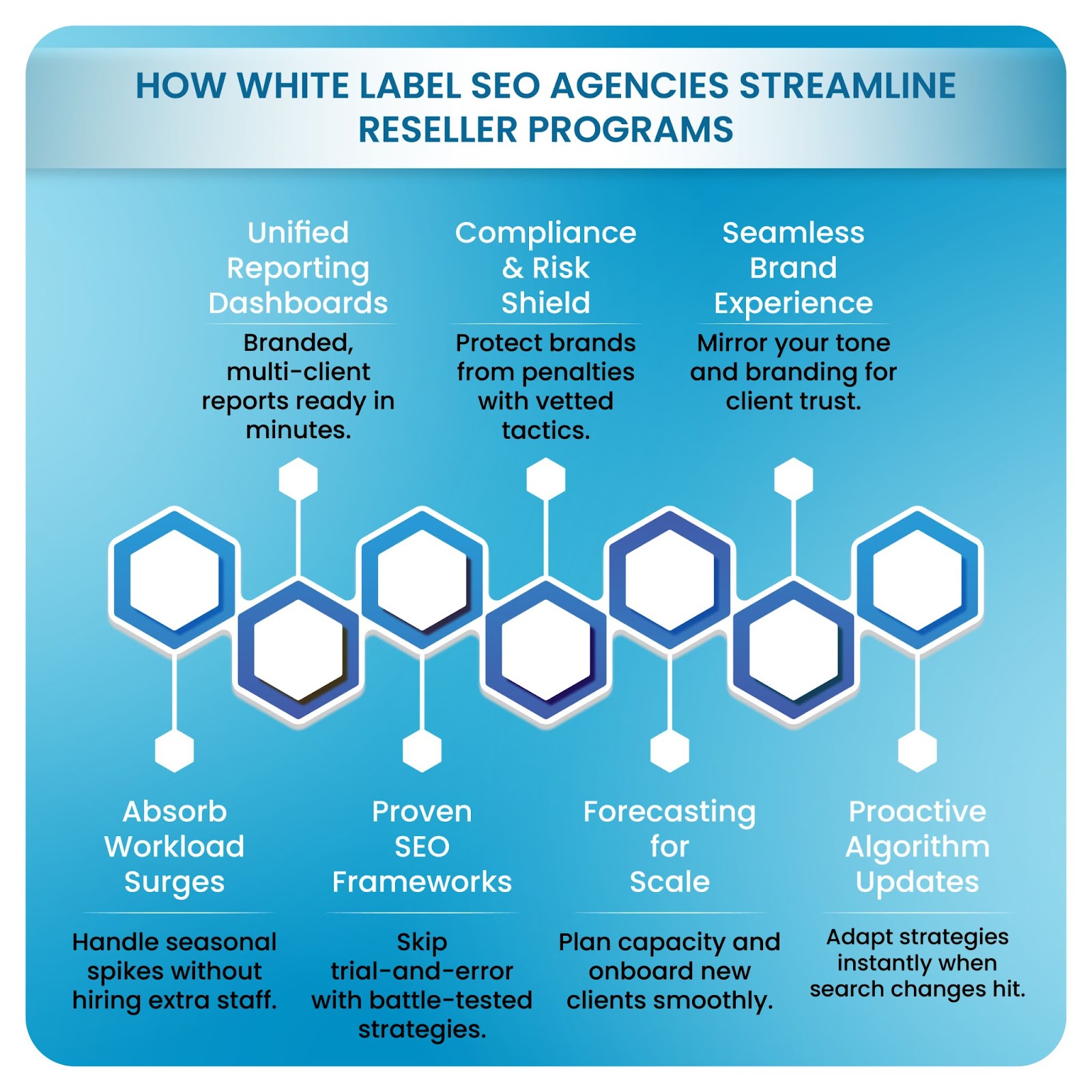
The Future of SEO Reselling: Where the Market Is Headed
The SEO landscape is evolving at a breakneck pace—driven by AI advancements, changing search behaviour, and Google’s continual focus on quality and intent. For agencies reselling SEO, staying competitive means not just keeping up, but adapting their offerings to meet what’s next.
Here’s what the future of SEO reselling looks like, and how your agency can prepare:
1. Hyper-Local SEO and Map Pack Dominance
Local searches like “near me” or “open now” have surged by over 400% in recent years, and nearly 46% of all Google searches now have local intent. That means the Google Map Pack (local 3-pack) is more valuable than ever.
What it means for resellers:
- Expect increasing demand from SMBs, medical practices, legal firms, and home services to dominate their local search results.
- SEO packages will need to include local citation building, NAP consistency, Google Business Profile optimization, and localized content tailored for specific zip codes or neighborhoods.
- Agencies must prioritise reputation management and review generation, both of which influence local rankings.
Opportunity: White label providers that offer hyper-local SEO packages—including dynamic location page creation and Google Maps integration—will lead the charge.
2. E-E-A-T and Brand Authority as Ranking Factors
With Google’s emphasis on Experience, Expertise, Authoritativeness, and Trustworthiness (E-E-A-T), SEO is moving far beyond technical fixes and backlinks.
Why this matters:
- Brands that build trust, showcase real authors, and demonstrate credible expertise will have an edge in organic rankings.
- Google’s algorithm is rewarding authentic content—especially in Your Money or Your Life (YMYL) niches like finance, health, and law.
Reseller strategy shift:
- Providers will need to invest in expert-written content, author bios, first-hand experience case studies, and stronger digital PR strategies.
- Agencies must position themselves as thought leadership builders, not just keyword rankers.
Pro Tip: Choose white label partners who use real content writers with subject expertise and allow branded authorship in deliverables.
3. Voice Search and Zero-Click Results
As of 2025, 20–21% of global internet users use voice search regularly, and zero-click searches already account for more than 65% of Google results—where users find answers directly on the search results page (SERP) without clicking.
What changes:
- SEO resellers must optimise for conversational queries, featured snippets, FAQs, and structured data.
Content must be formatted to quickly answer questions—preferably in 15–30 word summaries. - Schema markup, question-based content, and mobile-first designs will become non-negotiable.
Voice search-specific SEO includes:
- Targeting long-tail keywords that mimic natural speech.
- Optimising for “who, what, where, when” queries.
- Ensuring fast page load speeds and mobile responsiveness.
Key Takeaway: The most successful white label SEO programs will adapt to the growing need for immediate answers, frictionless access, and natural language optimisation.
4. Subscription-Based SEO Reselling
SEO has traditionally been sold as a monthly retainer, but the future is shifting toward tiered subscription models with clearer deliverables, bundled features, and automation baked in.
Why subscriptions win:
- They offer predictable revenue for agencies.
- Clients appreciate transparency and simplicity in what they’re buying.
- Automation platforms like DashClicks allow plug-and-play service bundles that reduce fulfillment time and costs.
What this model looks like:
- Bronze, Silver, Gold SEO plans—each with defined services (e.g., X blogs, X backlinks, X optimisations per month).
- Easy upsell/cross-sell pathways for PPC, social media, and content marketing.
- Clients receive automated, white-labeled reports and dashboards.
Future-focused agencies will adopt these models to scale faster, reduce churn, and enhance client satisfaction—especially when paired with smart onboarding and real-time analytics.
Why DashClicks Is the Go-To White Label SEO Partner?
If you’re stepping into the world of white label SEO, choosing the right partner is crucial. DashClicks is built specifically for digital marketing agencies looking to scale without compromising quality, transparency, or client experience.
Here’s why DashClicks’ white label SEO services stands out from the rest:
1. Expert Team: Gain access to a dedicated team of seasoned SEO professionals with proven experience in technical SEO, on-page optimisation, link building, and content strategy. DashClicks’ experts stay ahead of Google’s algorithm updates, so your clients always receive up-to-date, white-hat SEO strategies that align with best practices. Whether it's fixing crawl errors or crafting keyword-rich blog content, their team handles the heavy lifting with precision.
2. Transparent Fulfilment: With DashClicks, you’re never in the dark. You can track every deliverable—including backlinks, citations, content pieces, and technical SEO audit—directly within your dashboard. This transparency allows you to answer client questions confidently, provide updates during meetings, and maintain complete trust throughout the campaign. It's like having your in-house team, but with full visibility and zero management overhead.
3. 100% White Label: Everything your clients see—from reports and emails to dashboards and domain portals—is fully branded with your agency’s name, logo, and tone of voice. DashClicks operates entirely behind the scenes, meaning your clients never know a third party is involved. This keeps your brand front and centre, reinforcing your agency’s value and strengthening long-term client relationships.
4. Flexible Pricing: DashClicks offers scalable SEO packages that fit agencies of all sizes and specialisations—from boutique firms serving local businesses to large agencies handling eCommerce or enterprise accounts. Whether you’re managing a handful of clients or hundreds, you can choose the service level and budget that matches your needs—without committing to fixed contracts or overpaying for services you don’t use.
Whether your clients are local shops or national eCommerce brands, DashClicks has packages that fit.
Is White Label SEO Right for Your Agency?
If your goal is to scale without adding complexity, white label SEO is your leverage point. It empowers your agency to deliver high-value services, retain clients longer, and grow revenue—without reinventing the wheel.
White label SEO lets you say "yes" to more opportunities and deliver consistent results that build client trust.
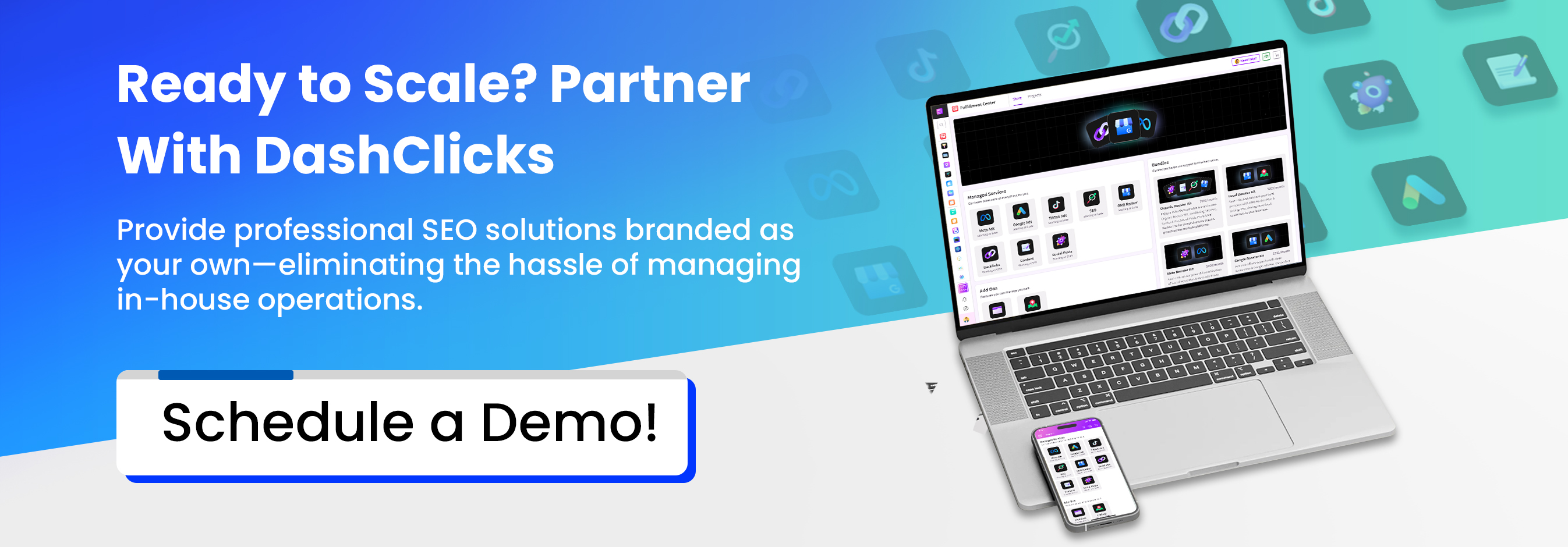

Local SEO Trends: What Agencies Can Outsource via White Label
The local SEO landscape has shifted dramatically over the past few years. From the rise of zero-click searches to the dominance of mobile-first indexing and the growing power of voice assistants, keeping up with the latest trends is no small task.
If you're running a digital marketing agency, managing local SEO for multiple clients can become overwhelming—especially when each client requires customized, detail-oriented strategies. This is where white label local SEO services step in as a game-changer.
By outsourcing key SEO tasks to a white label SEO company, agencies can scale operations, deliver better results, and focus on what they do best—client acquisition and strategic growth.
But which trends matter most right now? And which parts of local SEO can you confidently outsource? Let’s dive into the details.
The Growing Importance of Local SEO
According to Google, 46% of all searches have a local intent. Even more impressive, 78% of local mobile searches result in an offline purchase within 24 hours
For small and medium-sized businesses (SMBs), showing up in local search results isn’t just a marketing tactic—it’s a lifeline. This presents a huge opportunity for agencies to offer high-impact services to local clients.
The challenge? Managing multiple clients' local SEO campaigns efficiently and effectively.
Partnering with a white label SEO company gives your agency instant access to a team of experts that can take the reins of execution, while you focus on scaling your business and building strong client relationships.
Local SEO Trends That Matter in 2025
The local SEO landscape continues to evolve, and 2025 brings a set of high-impact trends that agencies must pay close attention to. These aren't just passing fads—they reflect deep shifts in how consumers search, how Google displays information, and how local businesses compete online.
Below are the most important trends shaping local SEO today—and how white label partners can help you stay ahead of the curve.
1. Zero-Click Searches Are Here to Stay
What’s Happening: As of 2025, over 65% of Google searches result in no clicks. This means users are getting the answers they need directly from the search results page—through featured snippets, Google Business Profiles, People Also Ask, and local packs.
Consumers now expect instant answers—location, phone numbers, hours, reviews—without ever visiting a website.

Implication for Agencies: Your job isn’t just to drive traffic anymore. You need to optimize visibility inside Google’s interface itself, where decisions are being made before the user ever clicks. If your clients aren’t showing up in zero-click searches, they’re being ignored.
White Label Tip: White label SEO company can help your agency:
- Optimize for featured snippets with structured answers and question-based content.
- Use structured data/schema markup to boost eligibility for SERP enhancements.
- Ensure clients’ GBP listings are complete and updated to win placement in local packs.
- Target “position zero” by aligning content with high-intent, informational queries.
By outsourcing this task, you save time while ensuring your clients occupy top-of-page real estate that converts.
2. Voice Search Optimization
What’s Happening: With the continued rise of smart speakers and virtual assistants, voice search is a dominant force in local discovery. Consumers are asking Siri, Alexa, or Google things like:
- “Where’s the best dentist near me open on Saturday?”
- “Find a vegan cafe that delivers right now.”
- “What time does [business name] close?”
These long-tail, natural-language queries make up more than half of local searches.
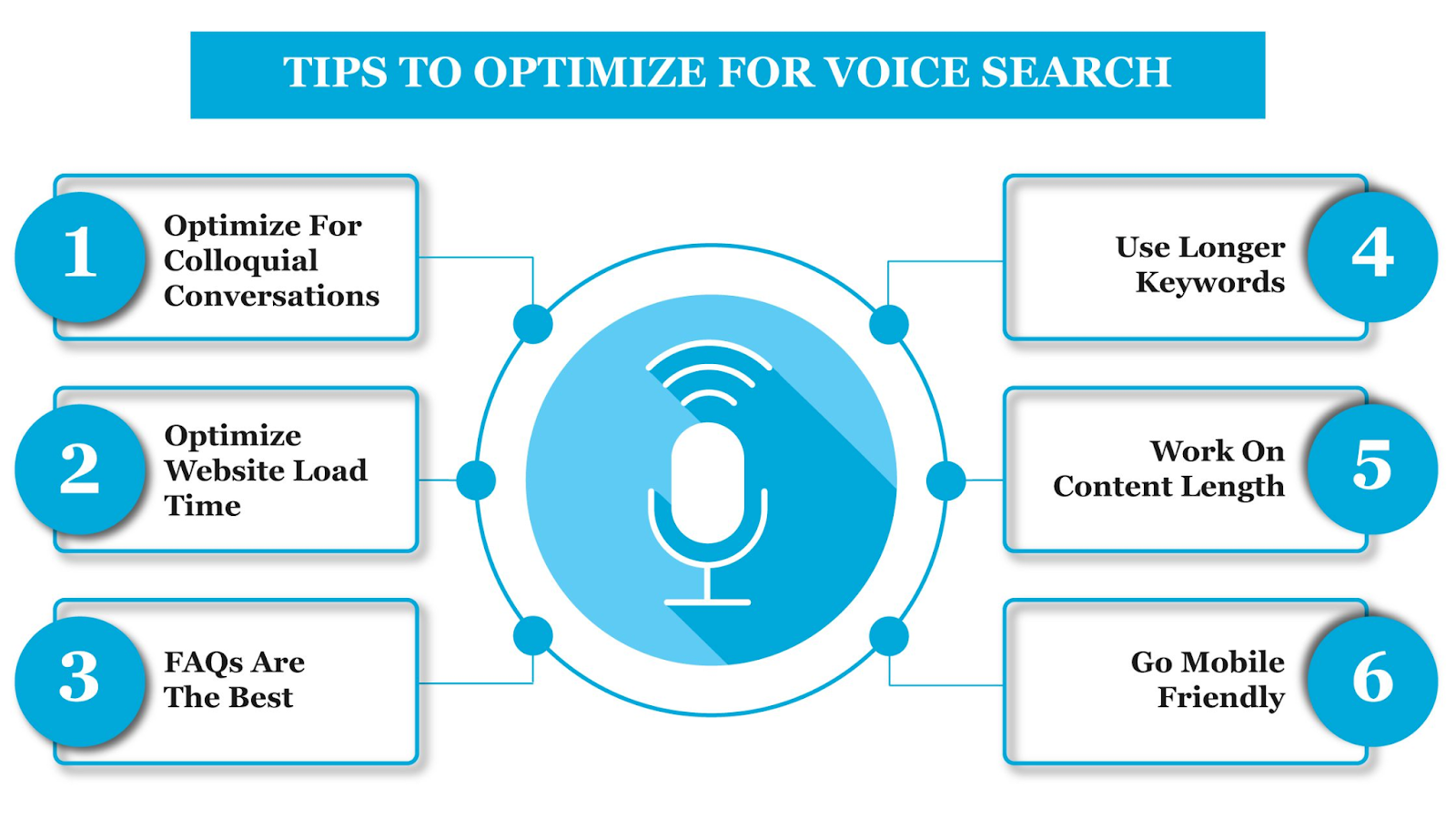
Implication for Agencies: Your clients need content that mirrors how people speak, not just how they type. That means:
- Conversational tone.
- Question-based headings (e.g., “How much does a plumber cost in [city]?”).
- Clear, short answers.
- Strong local signals (address, phone, hours).
White Label Tip: Voice search optimization can be complex. Let white label SEO partners handle:
- Schema implementation to help search engines interpret content for voice.
- Creation of FAQ pages that match spoken queries.
- Long-tail keyword research that targets conversational and intent-rich phrases.
- Optimizing location pages for voice-triggered “near me” searches.
A good white label team knows how to fine-tune content for Google Assistant, Siri, and Alexa, helping your clients win at voice-powered discovery.
3. Mobile-First Indexing
What’s Happening: Google now uses the mobile version of a site as the primary version for indexing and ranking. If a client’s site is slow, unresponsive, or difficult to navigate on a smartphone, they’ll be penalized in search—even if their desktop site is flawless.
Implication for Agencies: Mobile-first isn’t optional. Your clients need lightning-fast, mobile-optimized websites with seamless navigation and responsive design. Mobile UX is also directly tied to Core Web Vitals, which affect rankings.
White Label Tip: White label SEO providers can assist by:
- Running mobile SEO audits to detect performance issues.
- Implementing speed improvements like image compression, lazy loading, and minifying code.
- Enhancing mobile UX—buttons, tap targets, menus—for better engagement.
- Creating AMP versions (Accelerated Mobile Pages) where relevant.
Outsourcing ensures your clients' sites are not just mobile-friendly—but mobile-first and future-ready.
4. Online Reviews & Reputation Management
What’s Happening: In 2025, online reviews are more influential than ever. Google considers review quantity, quality, and velocity as major ranking factors. Consumers, meanwhile, rely on reviews as a form of social proof—especially when deciding between similar local businesses.
A strong review profile builds trust, visibility, and conversion rates.
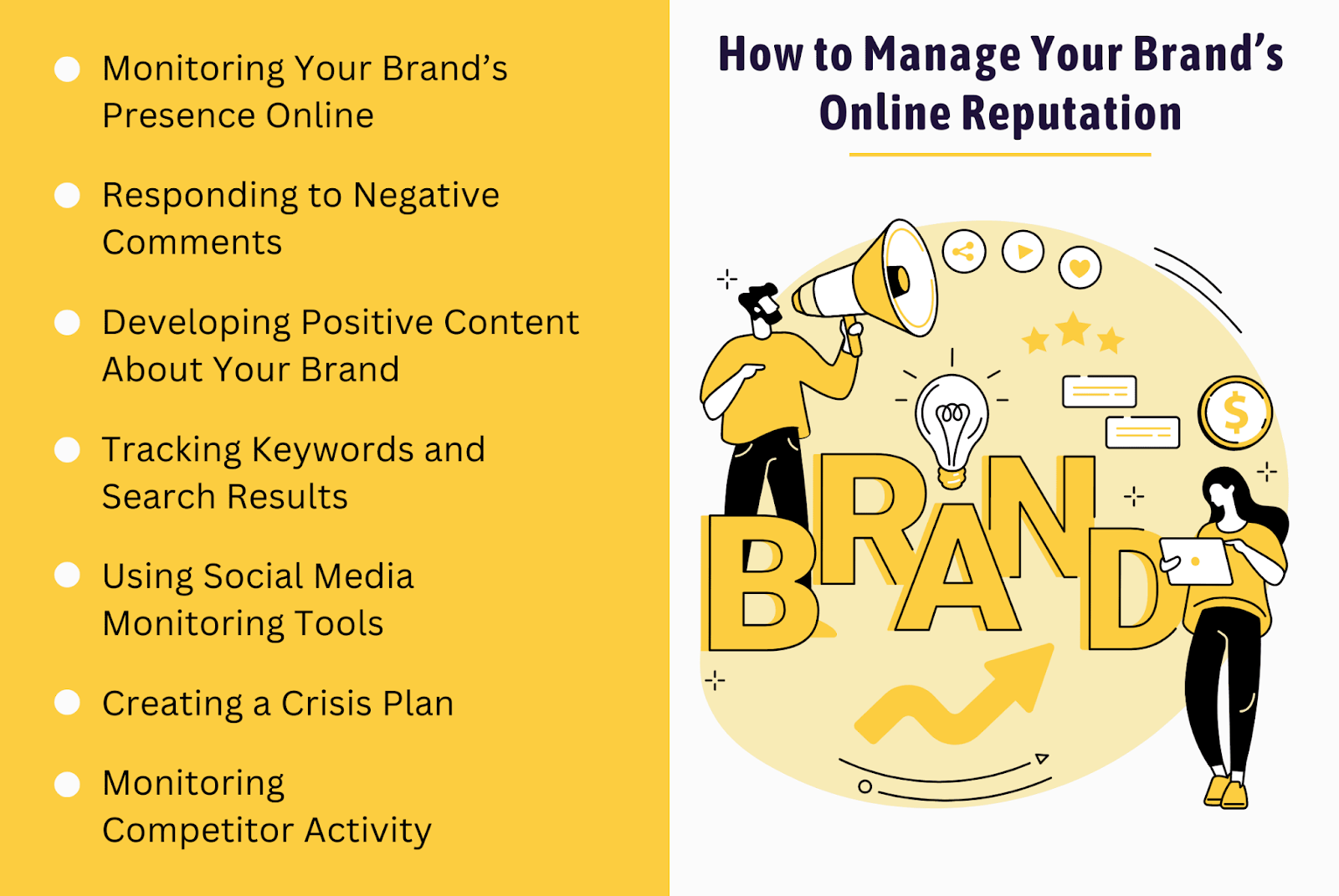
Implication for Agencies: You must help clients consistently generate, monitor, and respond to reviews across platforms like Google, Yelp, Facebook, and industry-specific directories. Ignoring this not only hurts rankings—it also risks brand perception and client loyalty.
White Label Tip: White label SEO companies offer:
- Automated review generation systems via email or SMS.
- Tools to respond to customer feedback and flag spammy reviews.
- Ongoing review, monitoring, and alerts for reputation management.
- Strategic advice on review timing and placement to maximize impact.
Instead of spending hours each week manually tracking reviews, agencies can rely on white label solutions to automate the entire process—and show measurable results to clients.
5. Google Business Profile (GBP) Optimization Is Non-Negotiable
What’s Happening: In local SEO, Google Business Profiles are the new homepages. They appear in map packs, brand name searches, and voice responses—often before a user visits the website. GBP is no longer set-it-and-forget-it. It’s a dynamic, real-time listing that needs weekly optimization to stay competitive.
Implication for Agencies: Agencies need to ensure GBP listings are:
- Fully completed and keyword-optimized
- Frequently updated with posts, photos, and offers
- Actively monitored for reviews and Q&A
- Clean of spammy or duplicated listings
White Label Tip: A trusted white label SEO partner can:
- Set up and verify GBP listings
- Optimize business descriptions, categories, and attributes
- Upload seasonal images and service updates
- Respond to reviews and community Q&A
- Post weekly offers and announcements
Consistent GBP optimization improves visibility in both the Local Pack and Google Maps, boosting traffic and conversions for your clients.
Further Reading: 12 Essential Google My Business Optimizations to Rank Higher in Local Search
6. AI and the Rise of Generative Local Search
What’s Happening: Artificial Intelligence (AI) is fundamentally changing how users interact with search engines. With tools like Google’s Search Generative Experience (SGE) and platforms like ChatGPT integrated into browsing, people are getting richer, contextualized answers—often without clicking traditional blue links.
Local SEO is no exception. AI can now:
- Summarize local business reviews.
- Suggest businesses based on search history and preferences.
- Generate personalized recommendations and comparisons.
Implication for Agencies: You must begin optimizing content for AI-powered SERPs, not just organic rankings. That means:
- Providing direct, digestible answers.
- Using structured data consistently.
- Targeting intent, not just keywords.
White Label Tip: Leading white label SEO providers will help your agency:
- Adapt content for AI-readability (e.g., concise intros, bullet lists).
- Implement a schema to make content digestible for SGE and AI assistants.
- Use AI tools for scalable content generation with local context.
- Stay updated on Google’s SGE rollout and new AI ranking factors.
Future-ready agencies will embrace AI as an asset—and a white label SEO agency can help you deploy it strategically without overwhelming your in-house staff.
Bringing It All Together
The 2025 local SEO landscape is driven by instant answers, conversational search, mobile optimization, trust signals, and AI evolution. For digital agencies, keeping up means:
- Being flexible in content strategies.
- Staying on top of technical updates.
- Offering consistent, data-driven results.
- Shifting from page views to visibility within Google’s evolving ecosystem.
And the smartest way to deliver all this? Partner with a white label SEO provider who lives and breathes these trends—so you can focus on growth, retention, and high-level strategy.
What Agencies Can Outsource via White Label Local SEO Services?
Outsourcing to a white label SEO company doesn’t just lighten your workload—it enhances the quality, speed, and scalability of deliverables. Here are the most valuable components to outsource:
1. Citation Building and NAP Consistency
- Build citations across top directories (Yelp, Apple Maps, Yellow Pages).
- Audit and correct NAP (Name, Address, Phone) inconsistencies.
- Ensure uniform data for better local authority.
2. Local Keyword Research
- Discover high-intent geo-specific search terms.
- Analyze competitor keywords and SERP features.
- Prioritize long-tail and “near me” queries.
3. Google Business Profile Optimization
- Complete missing sections.
- Add localized photos and videos.
- Post weekly updates or promos.
- Monitor Q&A, reviews, and analytics.
- Flag spammy competitors.
4. Hyper-Local Content Creation
- Blog posts targeting local trends or events.
- Location-specific landing pages.
- Optimized service pages with local modifiers.
- FAQ sections that improve voice search visibility.
5. Technical SEO and Site Audits
- Fix crawl errors, broken links, and poor internal linking.
- Implement schema markup for local businesses.
- Mobile UX and Core Web Vitals optimization.
- Fix HTTPS, sitemap, and robots.txt issues.
6. Link Building for Local SEO
- Outreach to local blogs and community sites.
- Listings on local chambers of commerce or newspapers.
- Ethical, white-hat backlinks for long-term ranking.
7. Review Generation and Reputation Management
- Set up automated email/SMS review requests.
- Respond to negative reviews on your client’s behalf.
- Improve visibility on sites like Yelp, Facebook, and TripAdvisor.
Agency Tip: DashClicks makes this process effortless with its powerful Reputation software, which allows agencies to track, request, and respond to reviews across multiple platforms—all from one white-labeled dashboard. With real-time alerts and automation features, it helps boost client credibility while saving your team time and effort.
8. Analytics and White-Labeled Reporting
- Track rankings, traffic, and conversions.
- Deliver monthly branded dashboards.
- Offer transparent progress reports with KPI.
9. Optimization for Multi-Locations
- Create and manage separate location pages with unique, geo-targeted content.
- Maintain NAP consistency across multiple branches or service areas.
- Customize Google Business Profiles for each location with relevant photos, hours, and service info.
White label providers are equipped to manage location-specific SEO at scale, helping your clients dominate local results across cities and regions.
10. Local Map Search Optimization
- Optimize business listings to rank higher in Google Maps.
- Use geo-tagged images, localized keywords, and review signals to boost visibility.
- Monitor and improve map pack presence for high-converting “near me” and branded searches.
Outsourced SEO teams know how to move the needle in map rankings by leveraging a combination of GBP signals, citations, reviews, and mobile UX improvements.
Why Outsourcing Local SEO Is a Win-Win for Agencies?
Outsourcing isn’t just about saving time—it’s a strategic move to increase quality, reduce overhead, and grow profitably.
- Save Time & Resources: Offload repetitive tasks and free up your in-house team for strategy and client communications.
- Scale Your Agency Effortlessly: Handle 5 or 500 clients without hiring additional staff.
- Improve Client Retention: When campaigns are consistent, results improve—and so does loyalty.
- Lower Overhead Costs: Pay for deliverables, not full-time salaries, benefits, and software.
- Boost Profit Margins: Charge clients premium pricing while keeping fulfillment costs low.
Best Practices for Successful Local SEO Outsourcing
To get the most out of white label local SEO services, agencies should follow a structured, results-driven approach. Here are some best practices that ensure long-term success:
- Define Clear Goals and KPIs: Establish performance metrics like keyword rankings, local pack presence, leads, or phone calls to measure ROI.
- Vet Your White Label Partner Thoroughly: Choose a provider with proven experience in local SEO, transparent processes, and strong client success stories.
- Prioritize Communication and Transparency: Maintain regular check-ins, access to dashboards, and collaborative workflows to ensure alignment.
- Start With a Pilot Project: Test the partnership with a few accounts before scaling to ensure quality, consistency, and compatibility.
- Customize Deliverables to Match Client Needs: Make sure outsourced tasks reflect the tone, geography, and niche of each client’s brand.
- Ensure White Label Branding: Choose a provider like DashClicks that offers fully branded portals, reports, and communications under your agency's identity.
When executed well, local SEO outsourcing can become a seamless extension of your agency—driving growth, efficiency, and client satisfaction at scale.
Building Stronger Client Relationships Through Outsourcing
Contrary to common fears, outsourcing doesn’t remove you from the process—it amplifies your value to clients.
With More Bandwidth, You Can:
- Offer deeper marketing consultations
- Hold regular strategy sessions
- Proactively suggest upsells (like ads or web design)
- Maintain better turnaround times
- Provide white-glove service
Result: Happy clients who stay longer and spend more.
The Future of Local SEO: What’s Coming Next?
The local search environment is evolving fast, and staying competitive means being agile. Here are emerging trends worth preparing for:
- AI-Generated Local Content: Used ethically and creatively, AI can assist in creating scalable, personalized, and localized content.
- Google SGE (Search Generative Experience): Early testing shows that SGE may surface businesses based on new criteria—like relevance, sentiment, and conversational prompts.
- Accessibility and Eco-Conscious Search: Google now rewards websites that are ADA-compliant and environmentally aware.
- Video SEO for Local Discovery: Short-form videos on YouTube, Instagram Reels, and TikTok are now a part of local brand discovery.
Pro Tip: Work with a white label SEO provider that stays ahead of trends and integrates them into your clients’ campaigns.
Why DashClicks Is the Right White Label SEO Partner for Your Agency?
If you're looking for a proven partner to streamline your SEO operations and scale your agency, DashClicks stands out as a top-tier solution.
What Makes DashClicks Unique?
- All-in-One SEO Platform: Manage everything from listings to analytics to review generation in one seamless dashboard—branded with your logo.
- Dedicated SEO Team: From keyword research to link building, every client campaign is executed by vetted experts.
- Transparent Reporting: Offer your clients real-time dashboards with SEO insights, performance metrics, and deliverables tracking.
- Scalable Infrastructure: Grow from 5 to 500 clients without breaking workflows, hiring stress, or loss of quality.
- Training, Support & Automation: With onboarding, automation, and responsive support, DashClicks makes outsourcing frictionless.
What You Can Outsource to DashClicks?
Here's a list of white label local SEO services DashClicks can handle for your agency, all under your brand:
- Google Business Profile Management
- Local Link Building
- Citation Creation and Cleanup
- On-Page SEO and Technical Audits
- Custom Local Content
- Review Monitoring and Response
- Branded Client Reports and Dashboards
Win the Local SEO Game With the Right Partner
Local SEO is no longer a niche service—it’s a business essential. Whether your clients are restaurants, law firms, realtors, or service providers, their ability to show up in local searches directly affects their visibility, reputation, and revenue.
But scaling local SEO across multiple clients, locations, and industries is no easy task. From technical optimization and content creation to GBP management and review generation, the execution demands deep expertise and constant attention.
That’s where white label SEO becomes a strategic advantage. By outsourcing complex, time-consuming local SEO tasks, your agency can focus on what it does best—building relationships, growing revenue, and delivering strategic value.
And when you choose the right partner, you don’t just lighten your workload—you elevate the quality of your services.
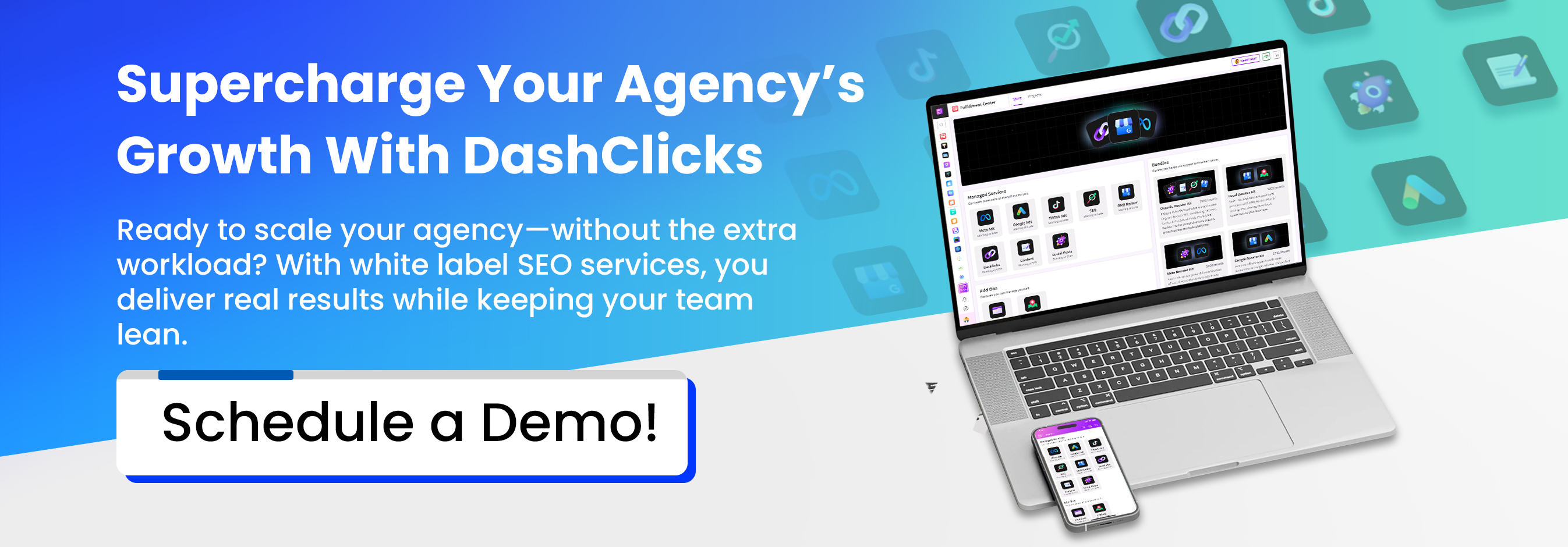

10 Ways White Label SEO Can Drive Rapid Growth for Your Agency
Running a digital agency means constantly balancing client demands with limited resources. You're juggling web design projects, managing social media campaigns, and creating content—then clients start asking about SEO services. Sound familiar?
White label SEO services offer a powerful solution to this challenge. By partnering with specialized SEO providers, agencies can dramatically expand their service offerings, increase revenue per client, and accelerate growth without the overhead of building in-house SEO teams.
The numbers speak volumes: agencies utilizing white label SEO services report an average revenue increase of 35-50% within the first year of partnership. More importantly, they achieve higher client retention rates and can confidently pursue larger, more lucrative contracts.
This comprehensive guide explores ten proven ways white label SEO can transform your agency's growth trajectory. From cost savings to scalability, we'll examine real-world strategies that successful agencies use to leverage white label partnerships for maximum impact.
1. Focus on Your Core Strengths While Expanding Service Offerings
Every successful agency excels at something specific. Whether you're a web design powerhouse, social media expert, or content creation specialist, your core competencies drive your reputation and client satisfaction.
However, modern clients increasingly expect comprehensive digital marketing solutions. They want a single agency partner who can handle everything from website development to search engine optimization. This creates a dilemma: do you stretch your team thin trying to master every discipline, or do you risk losing clients to full-service competitors?
White label SEO services eliminate this dilemma entirely. You can confidently offer professional SEO services while your team continues focusing on what they do best. When a web design client asks about improving their search rankings, you can seamlessly integrate SEO into their package without missing a beat.
This approach delivers multiple benefits. Your existing team maintains high productivity in their areas of expertise. Client relationships strengthen because you're meeting more of their needs. Most importantly, you're not diluting your brand by offering mediocre services outside your wheelhouse.
2. Leverage Expert Knowledge Without Building Internal Teams
Building an effective in-house SEO team requires significant investment and time. Senior SEO specialists command salaries ranging from $70,000 to $120,000 annually, plus benefits and ongoing training costs. For smaller agencies, this represents a substantial financial commitment before generating any return.
Beyond compensation, SEO expertise requires constant learning. Search engine algorithms change frequently, new tools emerge regularly, and best practices evolve continuously. Keeping an internal team current means investing in conferences, certifications, premium tools, and dedicated learning time.
White label SEO services provide immediate access to seasoned professionals who live and breathe search optimization. These specialists stay current with algorithm updates, maintain relationships with high-authority websites for link building, and possess deep technical knowledge that takes years to develop.
The expertise gap becomes particularly apparent with complex SEO tasks. Page speed optimization, technical audits, and penalty recovery require specialized knowledge that generalist marketers rarely possess. A white label partner handles these challenges routinely, ensuring your clients receive expert-level service without the learning curve.
3. Access Comprehensive SEO Services Under One Partnership
Modern SEO encompasses numerous disciplines: keyword research, on-page optimization, technical SEO, content creation, link building, local SEO, and performance tracking. Each area requires specific skills, tools, and processes.
Most agencies struggle to deliver comprehensive SEO services because they lack expertise in all these areas. They might handle basic keyword research and on-page optimization, but struggle with technical audits or high-quality link acquisition. This creates service gaps that competitors can exploit.
White label SEO providers offer complete service portfolios. When you partner with an established provider, you gain access to their entire range of capabilities. Your clients receive cohesive, comprehensive SEO strategies rather than piecemeal solutions.

This comprehensive approach proves particularly valuable for competitive industries where rankings require sophisticated strategies. E-commerce sites need technical SEO expertise, local businesses require citation management, and B2B companies benefit from content-driven link building. A quality white label partner handles all these scenarios effectively.
The breadth of services also enables better client retention. Instead of clients seeking multiple vendors for different SEO needs, you become their single point of contact for all search optimization requirements. This consolidation strengthens relationships and increases lifetime customer value.
4. Enjoy Flexible Partnership Terms Without Long-Term Commitments
Traditional agency partnerships often involve lengthy contracts, minimum commitments, and rigid terms that limit flexibility. These arrangements can become problematic if client needs change, business conditions shift, or service quality doesn't meet expectations.
Quality white label SEO providers understand that successful partnerships require flexibility. They offer month-to-month arrangements, scalable pricing models, and the ability to adjust service levels based on client demands. This flexibility proves crucial for agencies managing varying workloads and seasonal fluctuations.
Flexible terms also reduce financial risk when exploring new service offerings. You can test white label SEO with a few clients before making larger commitments. If the partnership works well, you can gradually expand. If it doesn't meet expectations, you can pivot without significant penalties.
The absence of long-term client contracts also provides negotiating power. Providers must consistently deliver quality results to maintain partnerships, creating natural accountability that benefits your agency and clients. This performance-based relationship ensures continued value delivery.
5. Minimize Risk When Entering New Markets
Expanding into new service areas or geographic markets involves inherent risks. Clients expect proven results, but delivering without experience creates challenging situations. Failed projects damage reputation, strain agency-client relationship, and can harm future growth prospects.

White label SEO partnerships significantly reduce these risks. You're leveraging established expertise, proven processes, and documented success records. When clients ask about your SEO experience, you can confidently discuss the track record of your white label partner.
This risk reduction proves particularly valuable when pursuing larger clients or more competitive projects. Enterprise clients often require detailed proposals, case studies, and references before making commitments. A white label SEO services for agencies provides the credibility and documentation needed to compete for these lucrative opportunities.
The learning opportunity also provides long-term benefits. Working closely with SEO experts helps your team understand effective strategies, common challenges, and industry best practices. This knowledge transfer gradually builds internal capabilities while minimizing the risk of learning mistakes on client projects.
6. Reduce Tool Costs Through Shared Resources
Professional SEO requires expensive tools for keyword research, rank tracking, technical audits, backlink analysis, and competitor research. Premium subscriptions for tools like SEMrush, Ahrefs, Screaming Frog, and Majestic can easily cost $500-1,000 monthly for full access.
For agencies serving multiple clients, these costs multiply quickly. Each client needs regular audits, ongoing monitoring, and detailed reporting. The tool expenses often consume significant portions of project budgets, especially for smaller clients with limited SEO budgets.
White label SEO providers maintain enterprise-level tool subscriptions and share access with their agency partners. This arrangement provides immediate access to professional-grade SEO tools without the individual subscription costs. You can offer clients detailed audits, comprehensive reports, and ongoing monitoring while maintaining healthy profit margins.
Many white label providers also offer branded dashboards that you can share directly with clients. These dashboards display campaign progress, keyword rankings, and performance metrics under your agency's branding. This transparency builds client confidence while demonstrating the value of your SEO services.
7. Generate Additional Revenue from Existing Client Relationships
Acquiring new clients requires significant marketing investment, sales effort, and time. Industry research indicates that acquiring new customers costs five to seven times more than retaining existing ones. This makes expanding services for current clients one of the most profitable growth strategies.
Existing clients already trust your agency, understand your communication style, and have established working relationships with your team. They're typically more receptive to additional service recommendations, especially when those services complement their existing projects.
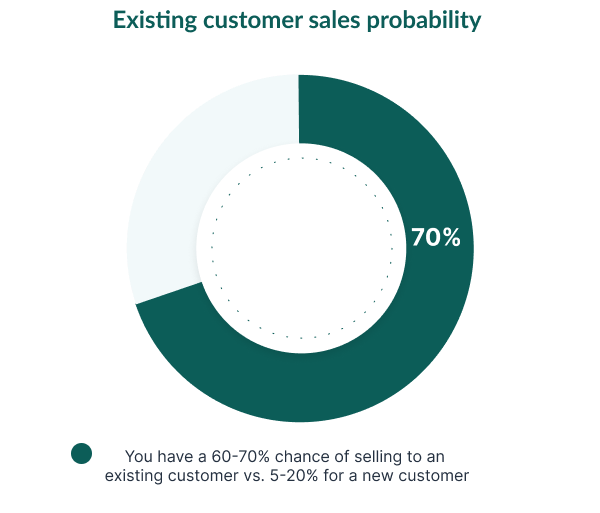
Image Source: SuperOffice
White label SEO services enable immediate expansion of offerings to your current client base. That web design client who's thrilled with their new website becomes an ideal candidate for ongoing SEO services. The social media client seeing engagement growth will likely invest in SEO to drive more website traffic.
Denver-based agency Digital Partners increased their average client value by 60% after introducing white label SEO services. They systematically reviewed their client roster, identified opportunities for SEO integration, and presented comprehensive digital marketing packages. Within six months, 40% of existing clients had added SEO services to their contracts.
The revenue impact compounds over time. SEO services typically involve ongoing monthly retainers rather than one-time project fees. This creates predictable recurring revenue that improves cash flow and increases overall agency valuation.
Further Reading: 11 Killer Strategies to Generate More Revenue from Existing Customers
8. Stay Current with Advanced SEO Strategies and Algorithm Updates
Search engine optimization evolves rapidly. Google releases thousands of algorithm updates annually, new ranking factors emerge regularly, and effective strategies shift continuously. Staying current requires dedicated time, ongoing education, and constant testing.
Internal teams often struggle to maintain cutting-edge knowledge while managing daily client responsibilities. They might understand basic SEO principles but lack awareness of advanced strategies or recent algorithm changes. This knowledge gap can limit client results and competitive positioning.
White label SEO providers specialize in staying current with industry developments. Their teams dedicate significant time to testing new strategies, analyzing algorithm updates, and refining processes based on performance data. This specialization ensures your clients benefit from the latest SEO innovations.
The depth becomes particularly apparent during major algorithm updates or penalty recoveries. When Google releases significant changes like Core Web Vitals or helpful content updates, specialized teams understand the implications and can quickly adjust client strategies. Internal teams might struggle to interpret these changes and implement appropriate responses.
9. Scale Operations to Meet Growing Demand
Successful agencies face a common challenge: growing client demand that exceeds internal capacity. Hiring additional staff takes time, involves recruitment costs, and requires training periods before new employees become productive. This lag between demand and capacity can limit growth opportunities.
White label SEO services provide immediate scalability. When new clients require SEO services, you can onboard them quickly without worrying about team capacity. Your white label partner handles the workload while you focus on client relationships and business development.
This scalability proves particularly valuable during growth spurts or seasonal demand increases. Rather than turning away clients or delaying project starts, you can confidently accept new business knowing your white label SEO partner can accommodate increased volumes.
The scalability also works in reverse during slower periods. You're not stuck with fixed overhead costs for specialized staff during lean times. The variable cost structure of white label partnerships provides financial flexibility that improves overall business resilience.
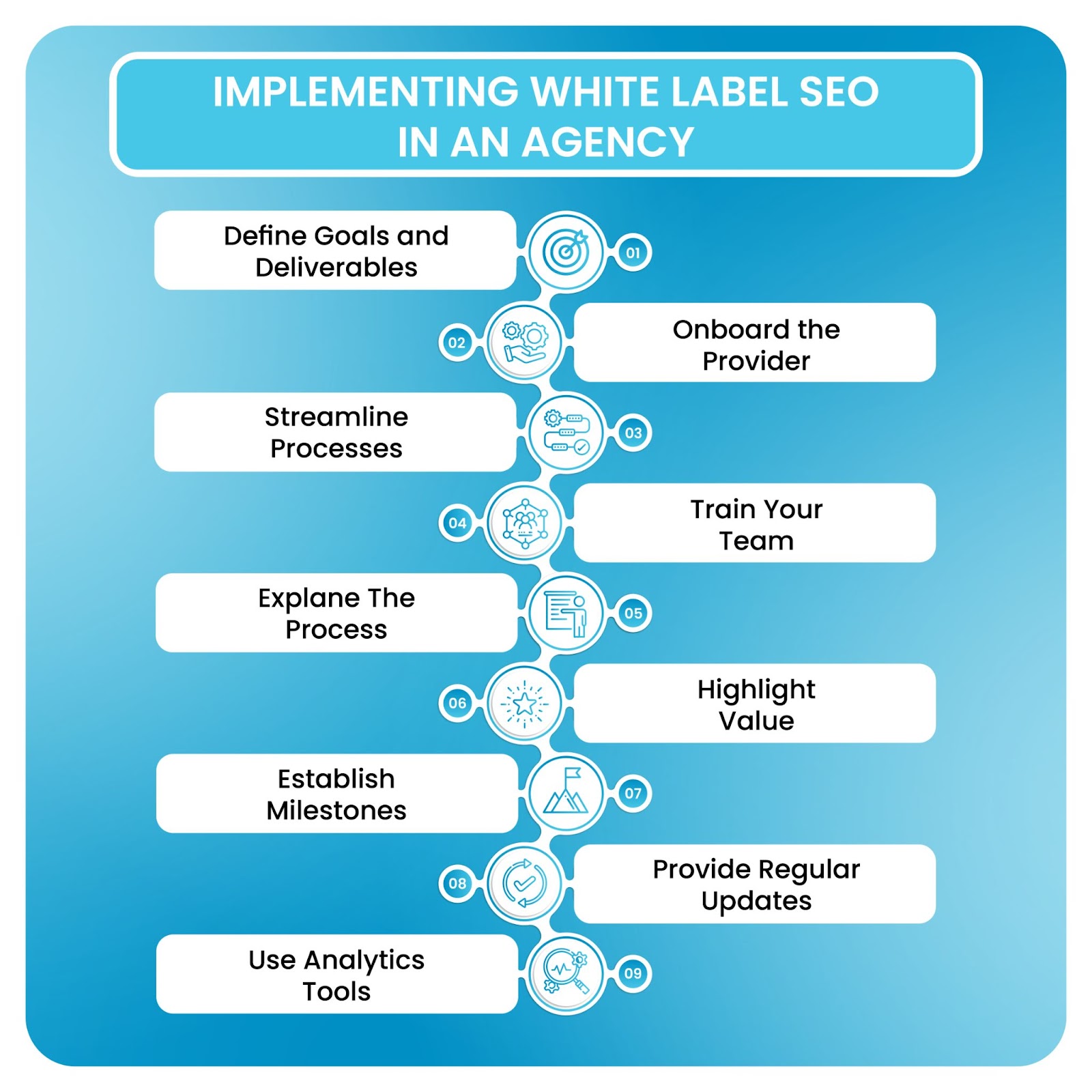
10. Improve Client Satisfaction Through Consistent Results
Client satisfaction ultimately depends on results delivery. Clients invest in SEO services expecting improved search rankings, increased organic traffic, and enhanced online visibility. Disappointing results lead to client churn, negative reviews, and referral losses.
Professional white label SEO providers have refined processes, proven methodologies, and extensive experience across various industries. This expertise translates into more consistent results for your clients. They understand what works, avoid common pitfalls, and can navigate competitive landscapes effectively.
Consistent results create positive feedback loops that benefit your entire agency. Satisfied SEO clients often expand their service packages, refer new business, and provide testimonials that support your marketing efforts. The success in one service area enhances your reputation across all offerings.
Quality white label providers also maintain transparent reporting and communication processes. Clients receive regular updates on campaign progress, understand the work being performed, and can see the value of their investment. This transparency builds trust and reinforces the partnership.
Why DashClicks Is the Ideal White Label SEO Partner for Growing Agencies?
When it comes to white label SEO, not all partners are created equal—and DashClicks sets the gold standard. Trusted by thousands of agencies, DashClicks offers a robust suite of white label SEO services delivered under your brand. From keyword research and technical audits to high-authority link building and real-time client reporting dashboards, the agency gives you everything you need to scale fast and deliver consistent results.
What sets the agency apart is its unmatched transparency, cutting-edge automation tools, and dedicated support structure. With seamless onboarding, customizable solutions, and month-to-month flexibility, the agency becomes more than a vendor—it becomes a strategic extension of your team. If you're serious about agency growth, aligning with a platform like DashClicks isn't just smart—it's essential.
Transform Your Agency Growth with Strategic White Label Partnerships
White label SEO services represent more than a simple outsourcing solution—they're a strategic growth accelerator for ambitious agencies. The ten strategies outlined above demonstrate how thoughtful partnerships can transform your service capabilities, revenue potential, and competitive positioning.
The most successful agencies approach white label partnerships strategically. They select providers whose expertise aligns with their client needs, whose processes complement their workflows, and whose values match their brand standards. This alignment ensures seamless service delivery and maintains the trust that clients place in your agency.
Consider starting with a pilot program involving a few clients to test the partnership dynamics. Monitor results closely, gather client feedback, and refine processes based on initial experiences. This careful approach minimizes risk while providing valuable insights for broader implementation.
The digital marketing landscape continues evolving, and client expectations keep rising. Agencies that embrace strategic partnerships position themselves to thrive in this competitive environment. White label SEO services provide the expertise, scalability, and flexibility needed to meet growing client demands while maintaining focus on your core strengths.
Ready to explore how white label SEO can accelerate your agency's growth? The next step involves evaluating potential partners, understanding their service offerings, and developing integration strategies that align with your business objectives.
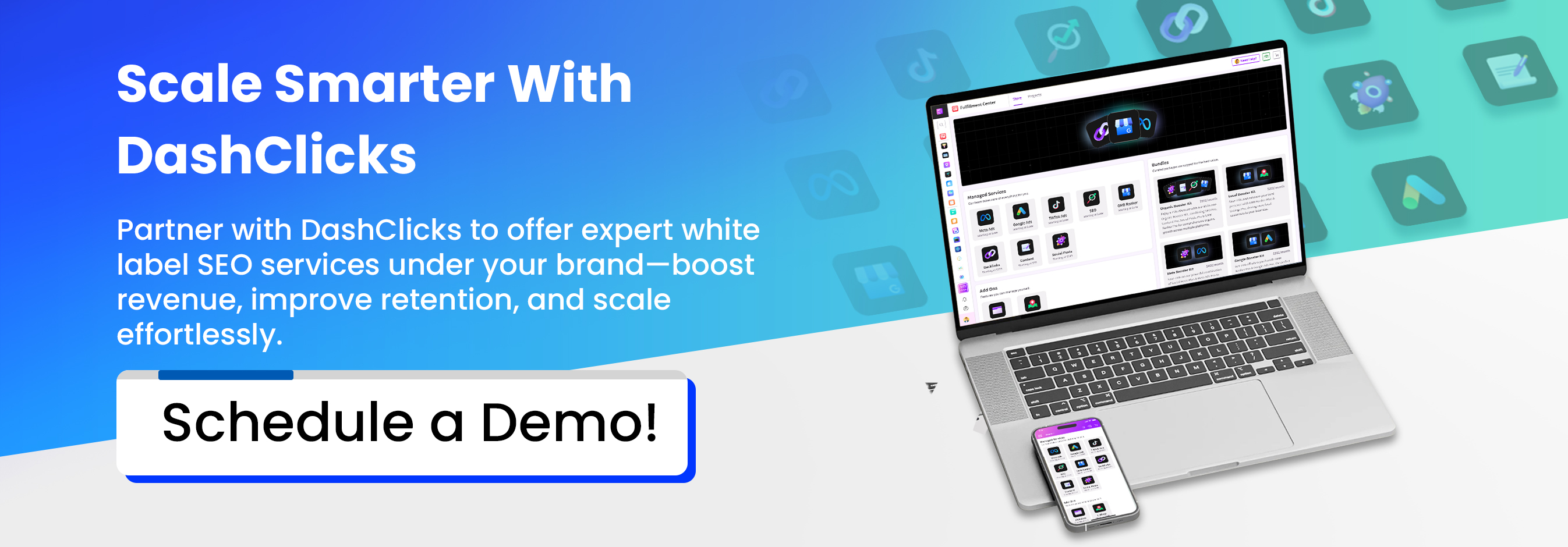

How to Choose a White Label SEO Partner That Delivers Real Results
Scaling your digital marketing agency shouldn't mean compromising on quality. When your clients demand exceptional SEO services but your in-house team is stretched thin, partnering with the right white label SEO provider becomes your secret weapon for growth and profitability.
The SEO industry is booming—projected to reach $122.11 billion by 2028, with nearly 10% annual growth. This explosive expansion creates massive opportunities for agencies ready to capitalize on the demand. However, choosing the wrong white label partner can damage your reputation, lose clients, and cost you thousands in revenue.
Smart agency owners know that the key lies in selecting a white label SEO partner who delivers measurable results, maintains transparent practices, and aligns with your business values.
This comprehensive guide reveals the exact strategies and criteria successful agencies use to identify partners who consistently drive organic traffic, boost rankings, and generate real ROI for their clients.
What Makes White Label SEO Different from Traditional SEO Services?
White label SEO operates as a behind-the-scenes partnership where an external agency provides SEO services under your brand name. Think of it as ghostwriting for digital marketing—your white label partner creates the strategy, executes the work, and delivers results, while you maintain the agency-client relationship and take credit for the success.
This differs significantly from traditional SEO services where you handle every aspect internally, from initial audits and keyword research to content creation and link building. With white label partnerships, you focus on client management and business growth while experts handle the technical execution.
Real-world Example: Here is how DashClicks helped Dillon Ross achieve $11k per month using DashClicks. He goes over strategy regarding must-have automations in your agency!
The partnership model creates a win-win scenario: your white label partner generates revenue without client acquisition costs, while you expand service offerings without massive overhead investments.
The Strategic Advantages of White Label SEO Partnerships
1. Rapid Scalability Without Overhead Burden
Hiring experienced SEO professionals is expensive and time-consuming. Senior SEO specialists command $75,000-$120,000 annually, plus benefits, training, and tool subscriptions. A complete in-house team requires multiple specialists—technical SEO experts, content creators, link builders, and analysts.
A white label SEO agency eliminates these costs entirely. You pay only for delivered services, allowing you to scale up or down based on client demand without long-term commitments or severance expenses.
2. Access to Premium Tools and Expertise
Top-tier SEO tools cost thousands monthly. Established white label providers like DashClicks already invest in these premium platforms, giving you access to enterprise-level capabilities without direct costs.
Case Study: In this YouTube video, Gil interviews Agency Owner Adam Dyess of Web Funnel Express and shares how he was able to scale up to $15,000+ in monthly recurring revenue using DashClicks.
3. Enhanced Service Quality and Consistency
Specialized white label providers focus exclusively on SEO, staying current with algorithm updates, industry best practices, and emerging trends. This specialization often results in higher-quality deliverables than generalist in-house teams juggling multiple responsibilities.
4. Risk Mitigation and Performance Guarantees
Reputable white label SEO partner stake their reputation on results. Many offer performance guarantees, penalty recovery services, and transparent reporting that protects your agency's reputation and client relationships.
Essential Services Your White Label Partner Must Provide
1. Comprehensive SEO Strategy Development
Your partner should deliver complete strategic planning, including competitor analysis, market research, and customized roadmaps aligned with client goals. Look for providers who create detailed project timelines, milestone markers, and success metrics.
Red Flag: Providers offering generic, one-size-fits-all strategies without industry-specific customization.
2. Technical SEO Expertise
Technical optimization requires specialized knowledge of site architecture, crawling issues, page speed optimization, and Core Web Vitals. Your partner should demonstrate proficiency with tools like Google Search Console, Screaming Frog, and GTMetrix.
Success Indicator: Partners who provide detailed technical audit reports with prioritized recommendations and implementation timelines.
3. Content Creation and Optimization
High-quality, SEO-optimized content drives organic traffic and engagement. Your white label partner should offer comprehensive content services, including keyword-optimized blog posts, landing pages, and multimedia content.
Quality Benchmark: Content that consistently achieves 70+ readability scores, incorporates target keywords naturally, and includes proper heading structure and internal linking.
4. Link Building and Authority Development
Effective link building requires relationships, outreach expertise, and quality control. Your partner should focus on acquiring high-authority, relevant backlinks through legitimate methods like guest posting, digital PR, and resource page inclusions.
Warning Signs: Providers offering cheap link packages, private blog networks (PBNs), or guaranteed link quantities without quality specifications.
5. White Label Reporting and Analytics
Transparent, branded reporting maintains client trust and demonstrates value. Look for partners providing customizable reports featuring key performance indicators, traffic growth, ranking improvements, and ROI calculations.
The 7-Step Framework for Evaluating White Label SEO Partners
Step 1: Analyze Their Digital Presence and Rankings
A white label SEO agency should demonstrate expertise through its website performance. Evaluate their organic search visibility, site speed, content quality, and user experience.
Evaluation Criteria:
- Domain authority above 50
- First-page rankings for competitive SEO-related keywords
- Site loading speed under 3 seconds
- Mobile-responsive design with excellent user experience
- Regular, high-quality blog content demonstrating industry expertise
Pro Tip: Use tools like Ahrefs or SEMrush to analyze their backlink profile, organic traffic trends, and keyword rankings. Declining performance often indicates outdated strategies or internal issues.
Step 2: Examine Case Studies and Results Documentation
Legitimate white label providers showcase measurable results through detailed case studies. Look for specific metrics, timeline documentation, and before-and-after comparisons.
Key Elements in Strong Case Studies:
- Clear challenge identification and strategic approach
- Specific metrics (traffic increases, ranking improvements, conversion growth)
- Timeline documentation showing sustained results
- Industry diversity demonstrating adaptability
- Client testimonials or quotes (when possible)
Red Flags: Vague claims, stock photos instead of real screenshots, or inability to provide specific performance data.
Step 3: Verify Their SEO Methodology and Ethics
Ensure your potential partner uses white-hat SEO practices aligned with Google's guidelines. Black-hat techniques might deliver short-term gains but risk severe penalties that could devastate client websites.
Questions to Ask:
- How do you approach link building and outreach?
- What tools do you use for keyword research and competitive analysis?
- How do you stay updated with algorithm changes?
- Can you provide examples of your content creation process?
- What's your approach to technical SEO audits?
Green Flags: Transparent explanations, current industry certifications, membership in professional organizations, and willingness to share methodologies.
Step 4: Assess Communication and Project Management
Effective communication prevents misunderstandings, ensures project alignment, and maintains client satisfaction. Evaluate their responsiveness, preferred communication channels, and project management software.
Communication Standards to Expect:
- Response times within 24 hours for urgent matters
- Weekly progress updates and monthly comprehensive reports
- Dedicated account manager or primary contact
- Clear escalation procedures for issues or concerns
- Collaborative project management platform access
Test Their Communication: Send detailed project inquiries and evaluate response quality, timeliness, and professionalism.
Step 5: Review Pricing Models and Contract Terms
Understanding pricing structures prevents budget surprises and ensures profitable partnerships. Common white label SEO pricing models include:
- Monthly Retainers: Fixed monthly fees for ongoing services, typically ranging from $2,000-$10,000 depending on scope and complexity.
- Project-Based Pricing: One-time fees for specific deliverables like site audits ($500-$2,500) or content creation ($150-$500 per article).
- Hourly Rates: Time-based billing ranging from $75-$200 per hour based on expertise level and project complexity.
- Performance-Based Pricing: Results-tied compensation models linking payments to achieved rankings, traffic growth, or conversion improvements.
Evaluation Criteria:
- Transparent pricing without hidden fees
- Flexible scaling options for business growth
- Clear deliverable specifications
- Reasonable contract terms without excessive lock-in periods
- Competitive rates allowing profitable resale margins
Further Reading: How Agencies Master White Label SEO Pricing for Maximum Profit
Step 6: Validate Industry Experience and Specialization
Different industries require unique SEO approaches. E-commerce sites need product optimization strategies, while local businesses require location-based optimization. Ensure your partner demonstrates relevant experience in your clients' industries.
Industry-Specific Considerations:
- E-commerce: Product schema markup, faceted navigation optimization, category page strategies
- Local Businesses: Google Business Profile optimization, local citation building, location-based content
- B2B Services: Long-form content strategies, technical keyword targeting, lead generation optimization
- Healthcare/Legal: HIPAA compliance, E-E-A-T (Experience, Expertise, Authority and Trust) focus, regulatory considerations
Verification Methods: Request client references from similar industries, review case studies matching your client profiles, and discuss industry-specific challenges during consultations.
Step 7: Test Their Knowledge With Technical Questions
Evaluate their expertise depth by asking specific technical questions about current SEO best practices, algorithm updates, and problem-solving approaches.
Sample Evaluation Questions:
- How do you optimize for Core Web Vitals and page experience signals?
- What's your approach to handling JavaScript-heavy websites?
- How do you implement schema markup for different content types?
- What strategies do you use for international SEO and hreflang implementation?
- How do you recover from Google penalties or algorithm updates?
Quality Indicators: Detailed, accurate responses demonstrating current knowledge and practical experience. Avoid providers giving vague answers or outdated information.
Red Flags That Signal Poor White Label Partners
- Unrealistic Promises and Guarantees: Legitimate SEO requires time and consistent effort. Providers promising "first-page rankings in 30 days" or "guaranteed #1 positions" likely use black-hat techniques that risk severe penalties. Set realistic timelines. Most SEO improvements require 4-6 months for significant results, with ongoing optimization needed for sustained growth.
- Lack of Transparency in Methods: Reputable providers willingly explain their strategies, tools, and processes. Secretive approaches often hide unethical practices or inexperience.
- Poor Communication and Unresponsiveness: Delayed responses, missed meetings, and unclear reporting indicate operational issues that will frustrate your clients and damage relationships.
- Extremely Low Pricing: While cost-effectiveness matters, suspiciously low prices often indicate corner-cutting, inexperienced teams, or unsustainable business models that risk service interruptions.
- No Clear Reporting or Analytics: Providers unable to demonstrate measurable results through detailed reporting lack the tracking capabilities essential for successful SEO campaigns.
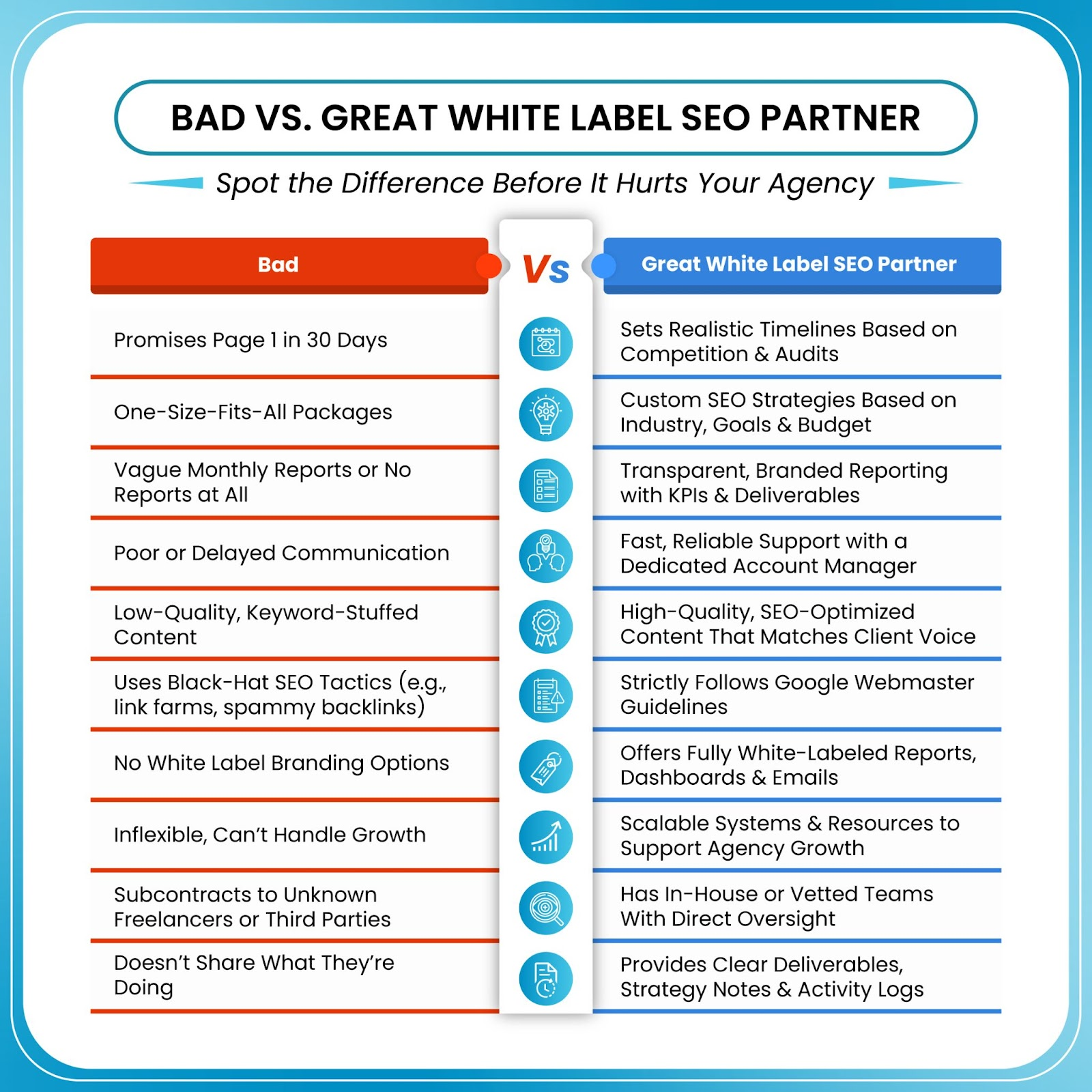
Maximizing Your White Label Partnership Success
- Establish Clear Performance Expectations: Define specific KPIs, reporting schedules, and success metrics before beginning any client projects. Document these expectations in service agreements to prevent misunderstandings.
- Maintain Regular Communication Rhythms: Schedule weekly check-ins and monthly strategy reviews to ensure alignment, address concerns promptly, and maintain project momentum.
- Invest in Relationship Building: Strong partnerships require mutual respect, open communication, and collaborative problem-solving. Treat your white label provider as a valued team member rather than just a vendor.
- Monitor and Measure Results Consistently: Track performance metrics, client satisfaction, and partnership ROI regularly. Use this data to optimize processes, address issues, and make informed partnership decisions.
Building Long-Term Partnership Value
The most successful agency partnerships extend beyond transactional relationships to strategic collaborations. Look for white label providers interested in understanding your business goals, client industries, and growth plans.
Consider providers offering additional value through:
- Training and education opportunities for your team
- Joint marketing initiatives and co-branded content
- Flexible scaling options supporting business growth
- Strategic consultation on industry trends and opportunities
Success Story: In this YouTube video, John Jones of JON JON & Co talks about his journey with DashClicks and how the partnership has helped him generate $10K MRR!
Why DashClicks Is the Right White Label SEO Partner That Delivers Real Results?
When it comes to choosing a partner who combines performance, transparency, and scale, DashClicks is one of the most trusted names in the white label SEO space. Built specifically for marketing agencies, DashClicks offers a complete suite of white label SEO services under your brand—including keyword optimization, backlink strategies, local SEO, and technical audits—executed by seasoned professionals.
Their platform goes beyond service delivery with a fully branded dashboard, real-time reporting, client onboarding tools, and automated workflows that save your team time while enhancing client satisfaction. They also invest heavily in the latest SEO tools and technologies, ensuring your clients benefit from enterprise-grade solutions without the associated overhead.
Whether you're an agency owner looking to scale efficiently or an established firm seeking operational consistency, DashClicks delivers real, measurable results—without compromising your brand’s integrity or service quality.
Your Next Steps to White Label SEO Success
Choosing the right white label SEO partner transforms your agency's growth potential and service quality. Use this comprehensive framework to evaluate potential providers, establish successful partnerships, and deliver exceptional results that retain clients and drive referrals.
Start by creating a detailed requirements document outlining your clients' needs, budget parameters, and success metrics. Then, systematically evaluate potential partners using the seven-step framework outlined above.
Remember: the cheapest option rarely delivers the best results. Focus on finding partners who demonstrate expertise, maintain transparent practices, and align with your agency's values and growth objectives.
The right white label SEO partnership doesn't just expand your service offerings—it accelerates your agency's growth, enhances client satisfaction, and positions you as a trusted authority in the competitive digital marketing landscape.
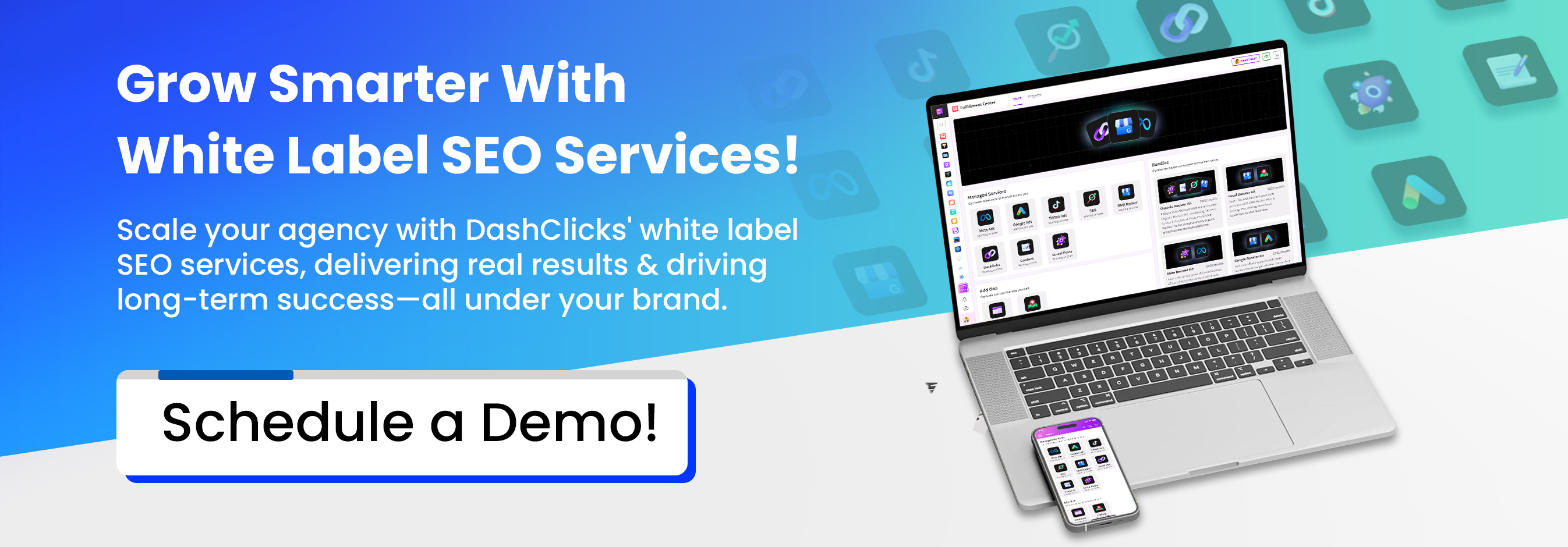

No results found.
Please try different keywords.
Get Started with
DashClicks Today
Get found online, convert leads faster, generate more revenue, and improve your reputation with our all-in-one platform.
.svg)
Unlimited Sub-Accounts
.svg)
Unlimited Users
.svg)
All Apps
.svg)
All Features
.svg)
White-Labeled
.svg)
Active Community
.svg)
Mobile App
.svg)
Live Support
.svg)
100+ Tutorials
.svg)
Unlimited Sub-Accounts
.svg)
Unlimited Users
.svg)
All Apps
.svg)
All Features
.svg)
White-Labeled
.svg)
Active Community
.svg)
Mobile App
.svg)
Live Support
.svg)
100+ Tutorials
.svg)
Unlimited Sub-Accounts
.svg)
Unlimited Users
.svg)
All Apps
.svg)
All Features
.svg)
White-Labeled
.svg)
Active Community
.svg)
Mobile App
.svg)
Live Support
.svg)
100+ Tutorials



.svg)
.svg)
.svg)
.svg)
.svg)


